#This is all just analysis
Explore tagged Tumblr posts
Note
Thoughts on Riverstar? I find him interesting, especially considering he objects to early clan life but ultimately becomes a leader despite that
River Ripple is actually one of the most interesting parts of DotC and if the Erins actually cared about how Clan Culture evolved, they would have made him a much bigger player in DotC. But no, instead, we've smacked the climactic Battle of Fourtrees in the MIDDLE of the arc to make room for the Clear Sky Redemption Arc That Isnt Even A Redemption Arc.
But hey at least we got One Eye and Slash. We all remember One Eye and Slash right. Those were villains that definitely didnt feel forced and entirely completely didnt contribute to the 'evil foreigner' thing that warrior cats as a series is plagued with
No it doesn't count if you only remember One Eye through CheeCats, CheeCats has a massive brain and can do whatever they want forever. If you or a loved one has started shipping River Ripple x One Eye as a result of CheeCats you may be entitled to financial compensation.
i am included in this demographic.
But enough grinding my teeth over the parts of DotC I don't like. This is about Riverstar, a part of DotC that I DO like
Cats of the Park
The Cats of the Park have such a fascinating culture, and it seems to have a bunch of the 'missing pieces' that the Sun Trail cats don't share with their descendants. The mentor/apprenticeship system, the nature reverence, the changing of names after significant events, the rigid schedules and rituals of their daily lives...
Even the leap to worshiping STARS comes from River Ripple and the Cats of the Park.
Heck, it would have been super cool if the Clan cats actually got to react to the destruction of the Park. I think that would have been a really fun and horrific way to rise up the tension, put more stress on the forest to feed a sudden influx of cats, and establish that humans are starting to encroach.
ESPECIALLY if it happened after Thunder Rising, you know? Set up River Ripple as one of Thunder's good friends, helping him realize that his relationship with his biodad is toxic. Then he falls into the river but comes out okay, instilling a reverence of the forest in ALL of his friends
Riverstar Himself
It's really cool to see that River himself is so relaxed about everything, it's a fun and refreshing mindset that we don't get in very many cats, ESPECIALLY not after the rigidity of Clan life is established in later books.
I think that would have been a super cool contrast to the invasive mountain cats, with Clear Sky bringing his concept of borders and battles, and River Ripple trying to appease him with teamwork and diplomacy... and Thunder, Wind Runner, and Tall Shadow realizing it is not going to work.
So I think if there's one thing I really don't like about River Ripple as a character, it's how he doesn't get dragged into the bigger conflicts.
I don't think any character should have gotten that luxury, especially not someone who will become a leader later on. I think the writers let him have too much of an easy time hiding behind his river and watching everything happen from afar.
He does get involved in the One Eye and Slash conflicts, of course... but personally it just feels kinda weak.
Like, he understands the purpose of getting involved AFTER witnessing the corpse-making event at Fourtrees, not suffering loss or injury exactly because he minded his own business? Feels backwards to me.
So to be clear: What I WANT is for him to not want to get involved, but the plot should keep dragging him back in against his will.
Anyway, overall I really like the guy.
#Warrior Cats Analysis#I have a lot of ideas for how I plan to rewrite DOTC and it's one of the few arcs I am willing to massively overhaul#and for the record i will actually be making River Ripple x One Eye a part of it because it's my kitchen and im hooked.#I really think there's just. No salvaging the horrible pacing if you put the Four Trees Battle at the middle.#It was a horrible idea and not even worth the IDEA of what came after#Clear Sky's redemption was a BAD idea#We ended up having two ridiculously out-of-nowhere rogue bands because they tried to nonsensically soften the main antagonist#It's almost like the main driver of conflict......... drives the main conflict#One Eye and Slash will remain in extremely altered forms#And Tom may end up being fused with Slash#Tom being the kittypet name and Slash being the name he gets after shacking up with One Eye#River Ripple#Riverstar#I didn't get into my rewrite in this post btw#This is all just analysis#Rereading my post now and man even when I'm talking GOOD about DotC you can see how much I dislike this arc#IT DOES HAVE GOOD PARTS#I just personally feel it's mega outweighed by the bad#and even the good parts are suspended in the aspic jelly of the rest of the plot#Anyway this has been Bones Rambles in the Tags Hour#And I will be doing my beloved sketch requests because I found some colored pencils lmao
36 notes
·
View notes
Text
So normal about Jon being like I don’t remember what you looked like but the man who let you die is going to suffer for what he did to you. If only Sasha coulda seen that.
So normal about Jon being like you died hating me and wanting me dead but I’m still gonna make sure this man knows I’m ending him in your name. Sure wish Tim coulda seen that.
So normal about the fact that everyone believed Jon was losing his humanity but no one got to see the ways his love and compassion for the people he lost or who hurt him drove him to that final moment.
So normal about the fact that even after everything Jonah’s done to Jon, the only person he never thinks to get justice for is himself.
#same energy as Jon diving into the buried to save the woman who tried to kill him#for all his flaws Jon’s a good person at his core#he just wholeheartedly believes he deserves to be hated so he never even tries to explain himself#analysis#istg every time I post one of these I get closer to writing a full dissertation on this guy#tma#the magnus archives#jon sims#jonathan sims#tim stoker#tma 200#sasha james#jonah magnus
7K notes
·
View notes
Text
i have suddenly become obsessed with a theme that HoO established but never proceeded to extrapolate on, which is:
You are Percy Jackson, and you have been swapped with a boy who was allegedly everyone's favorite person, but they have decided to replace him with you. They just met you. You stand next to his best friend and the people he's known his entire life. In his home. In his cloak. In his place. They stopped looking for him.
You are Jason Grace, and you have just found out you have a long lost sister who completely replaced you in her life with this girl you just met. Your lives and personalities are mirrors. She is you, living the life you were robbed of.
You are Annabeth Chase, and you have just become starkly aware that you have been inhabiting the void left behind by your best friend's long lost brother. You and Luke were just replacements for him. Now you have to look him in the eyes when he has nothing and know you took that life from him.
You are Piper McLean, and you have just found out your relationship is fake and built entirely on the memories of Annabeth Chase. You have been given a boyfriend when hers has been taken away. You have no idea how much of it is real or not but regardless you feel like if your relationship isn't exactly in their image that you have failed.
You are Leo Valdez, and you have just learned that you are the echo of your great-grandfather. You are not your own person. You just exist to be a mirror of him. A doppelganger. An actor and stunt double facing all the danger he never had to but wearing his face. To be there for his best friend decades later simply because he couldn't. You are playing a role. A seventh wheel and a pawn for a goddess who carefully sculpted your entire life for her own purposes.
You are Hazel Levesque, and the only reason you are alive is because your brother couldn't save your his sister. You are a consolation prize. An apology. Your existence here is misplaced in every way but you inhabit it anyways.
You are Frank Zhang, and you are a shapeshifter. Inhabiting your own body feels strange and clumsy when you could be literally anything at any time. You are anything and everything and live your life with the simple certainty of knowing exactly how you will die.
#pjo#hoo#heroes of olympus#percy jackson#riordanverse#jason grace#annabeth chase#piper mclean#leo valdez#hazel levesque#frank zhang#meta#analysis#me shaking hoo: what if we actually address the interpersonal dynamics of the characters. please. please. please. please.#frank is the only person on the boat not having an identity crisis tied to another member of the crew somehow and that is FASCINATING#but also WHERE is all the interpersonal literally anything. hello. please. making grabby hands. everybody identity crisis go.#i wanna see the entire argo ii crew stumbling through trying to figure out their places and senses of self!!!!!#particularly in relation to each other!!!!! we get snippets but we rarely ever get the full thing or a resolution!!!#like. HELLO??? Piper acknowledging that her relationship with Jason is artificially sculpted in the image of Annabeth and Percy???#and that her ideals of what Jason and her can be are just that she feels like they need to be like what Percy and Annabeth have????#and thats just DROPPED COMPLETELY????#poor Jason is getting replaced twice. Leo is not his own person.#Hazel at least gets the resolution that Nico does not truly see her as a consolation prize#but Annabeth gets to be hit with the like EIGHT YEAR DELAY of learning the place she inhabits in Thalia's life is the echo of someone else#cause like. yeah she knew Thalia had lost her brother but i dont think it clicked for her until she met Jason that oh. she *replaced* him#Frank at least has some certainty about his identity in one aspect (his curse). everybody else is floundering a bit#except for maybe Percy but its kind of the camps of ''i replaced this person and it weighs on me'' versus ''i have been replaced''
2K notes
·
View notes
Text
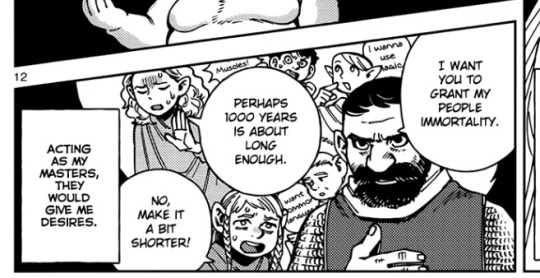
Not sure how widely recognized this is but it’s fucking wild to me that miss kui just quietly snuck in the fact that most (if not all) of the differences between races only exist because of wishes they made to the Winged Lion.
Dwarves being strong? Lion wish. Elves being good at magic? Lion wish. All lifespan differences???? Lion wish, babey!
Not that the elves superiority shtick isn’t already BS, but it’s even funnier with the context that the only difference between them and humans is that, thousands of years ago, their leaders made a greedier wish to the demon that wanted to eat them.
#dungeon meshi#delicious in dungeon#dunmeshi analysis#truly I think about this all the time it’s wild#something great here too in like not only that it’s all bs but that so much of the bs is due to what advantages are inherited#from privilege. elves aren’t special there are just 500 year old nepo babies#dungeon meshi spoilers
5K notes
·
View notes
Text
one of my favourite little things about the murderbot diaries is how present all secunit's friends are even if they're not actually physically present. it doesn't do the annoying thing where it jumps through hoops to bring back characters that aren't really relevant to the narrative but it also doesn't do the other annoying thing where it pretends they never existed either. like secunit talks about art and mensah all the time even when art or mensah aren't in the book. it's clear how bharadwaj has impacted its personal growth even when she's literally on another planet. it complains about gurathin and pin-lee when they're not there. it's still sad about miki and don abene and it mentions tapan and maro and rami even though it only knew them for a few days (because when you're new at being a person every interaction with other people is important even if it's short). iris reminds it of mensah. iris also reminds it of ratthi. its hair is fluffy bc it let amena play hairdresser off-screen and it messages her so she knows it's okay. it doesn't have to worry about protecting volescu anymore because volescu retired thank goodness. it's still using thiago's language module. etc etc etc
it's such good writing because it's such a little thing that gives the characterization and relationships greater depth and also reinforces the running theme of friendship in the series and then also subtly gives this sense of 'the people you love are a part of you/your story' and also reinforces secunit's role as a storyteller because it's constantly telling little stories about all its friends.
#theyre good books brent#murderbot#dont mind me apparently when i have an evening nap and no work the next day#i stay up late possessed by a spirit of literary analysis.#oh hell im probably going to have another super nerdy literary dream tonight ffs.#the fact that this has happened multiple times is both sad and embarassing. i know we should all just be ourselves and embrace the cringe#but dreaming about literary analysis is really going too far i think.#if youve read all these tags you should also read the murderbot diaries. thank you and good night.
1K notes
·
View notes
Text

the funeral
#my art#fnaf#five nights at freddy's#henry emily#william afton#michael afton#elizabeth afton#it’s a henry pov i can’t explain. robots and analysis and all that. grins. annotations#i. oughhhhgggh#i need to sleep so not gonna explain all the text BUT. THETES SO MUCH TO READ INTO. GRINS#drawing this broke my HEART#INTERTWINED. SEWEN TOGETHER. NOT A LOt. JUST FOREVER.#OKAY. WALKS INTO THE WOODS.#still here. his car!#poor kid. never again.#guy who can be really normal about his own art
1K notes
·
View notes
Text
Chuuya's reaction to Dazai getting hurt during the Lovecraft fight has always been so interesting to me...
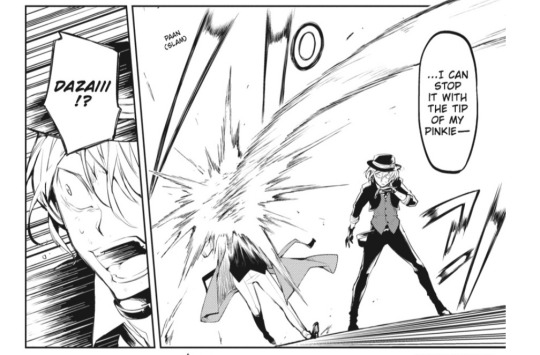
Because it's the kind of worry you'd never expect from a character as gruff as Chuuya, who had displayed nothing but hostility towards Dazai so far. Usually, characters that are labelled as "angry" or "anger issues" (which Chuuya is much more complex than that but you get my point) act more as a tsundere type of way when the one they "don't care about" gets hurt. And show their care in very, very subtle ways (ex. their eyes widen, their mouth parts and closes again, etc) before putting up their front once more.
Chuuya, however, is open, and vocal about it. His worry is clear not only to us, but to Dazai himself, the one he shouldn't be displaying the concern to (as per the cliche). Shouldn't it be some sort of secret that Chuuya does care? Isn't that what skk's dynamic has been shaping up to be until now?
I'm telling you- the way my mind blanked when Chuuya just casually.... showed concern not once, but twice, was a sight to see.
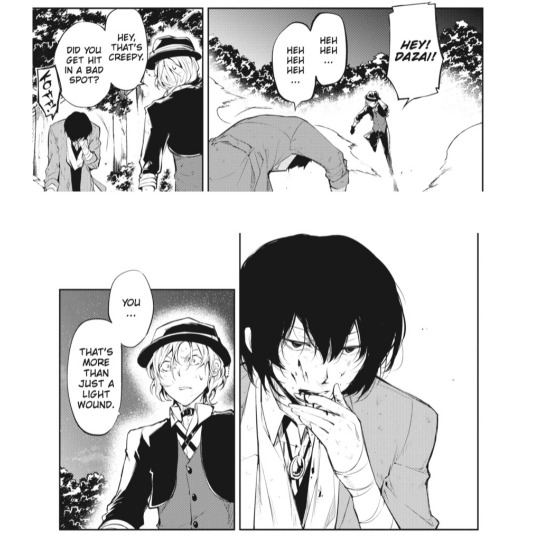
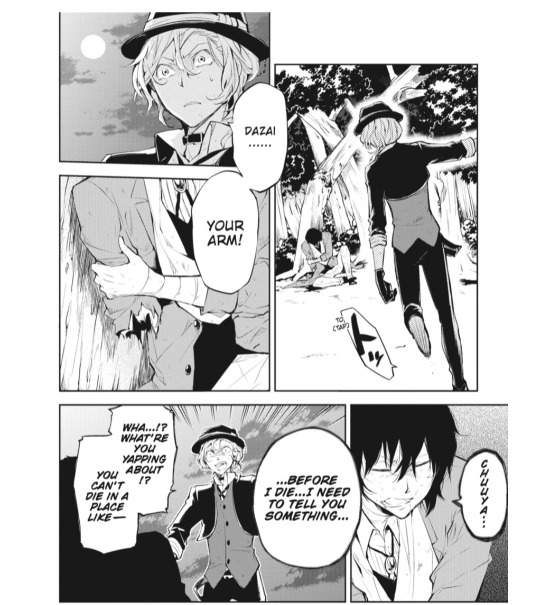
Besides, the context makes it much more confusing, because Dazai isn't some rookie, and Chuuya knows that more than anybody. He was the youngest executive in Port Mafia's history, of course he can handle a hit or two. Of course he'd seen him handle a hit or two, sometimes without batting an eye.
Heck, Chuuya himself was hurling Dazai like a ragdoll in their reunion, which was their last meeting. And you could argue that he was going easy on him, but Dazai has mostly withstood the same damage (as far as I could see), and Chuuya was as bitter as ever.


So that kind of contradicts both what we knew of Chuuya so far, and how their dynamic was shaped to be. I mean, that just makes Chuuya a hypocrite, yeah? What makes him care now, all of a sudden? What makes him care at all?
Well, to me, this backasswards reaction implies one (or more) of the following:
- Dazai rarely got physically hurt during their partnership and thus this is an unexpected thing for him to see (during a mission).
- The four years of separation made Chuuya unsure of how much Dazai can withstand physically now. Also the fact that he isn't in the mafia anymore, aka fighting enemy organizations on the weekly, would naturally make Dazai lose his touch in a way, what prompts Chuuya's reaction.
- Dazai getting taken off guard took him off guard which led to panic. Especially since the situation was (momentarily) out of their depth. Seriously wtf even was Lovecraft?
- During the dungeon scene Dazai was an enemy, while in the Lovecraft fight he was as an ally. The difference might be significant to Chuuya.
- This has always been Chuuya's reaction to Dazai getting hurt regardless of the situation.
- "Only I can hurt him like that" ahh logic
- Asagiri was still experimenting with their dynamic and thus there are some inconsistencies.
This scenario didn't play out again (after their reunion) for me to exactly determine which one is more plausible, but it is 100% canon for Chuuya to shamelessly show his concern and run to Dazai to check on him before properly dealing with their opponent, which I find to be such an appealing layer to their dynamic, and a good spin on the type of character he gets stereotyped as.
Bonus: Dazai also becomes a softy when Chuuya's hurt, especially post corruption. Dead Apple alone displays that multiple times.
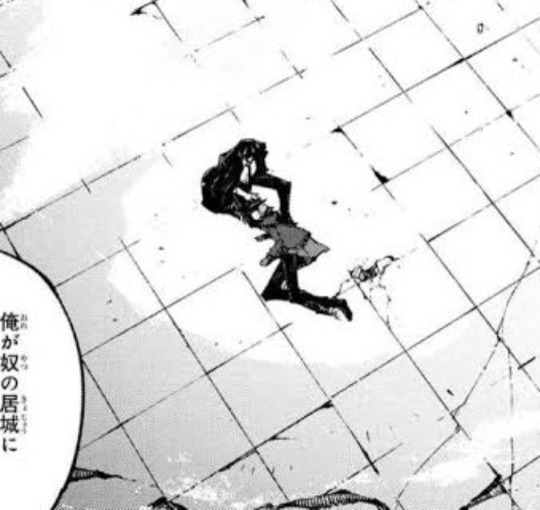
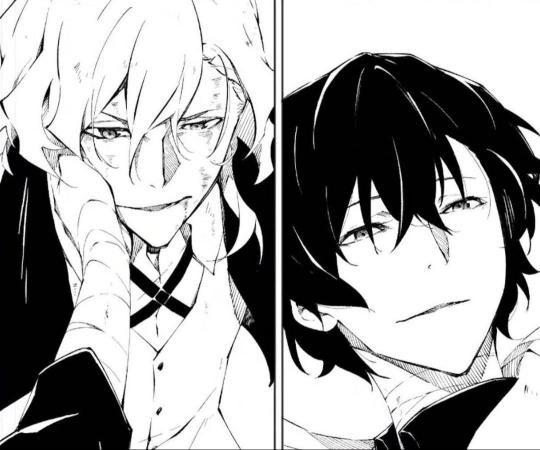
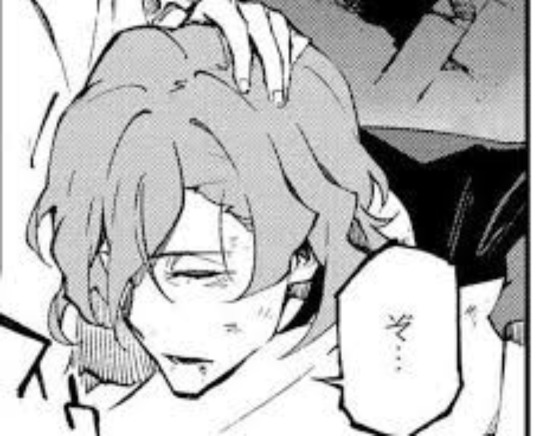
All in all, Skk are doing a terrible job at maintaining their 'hostile' and 'antagonistic' relationship post their reunion. Freaks.
#I was too lazy to scour throgh SB and 15 and find Chuuya getting worried again which might prove the last points#tho I think they're the most unlikely#I love them displaying these sort of things openly#for Chuuya it's just natural to be concerned#it's natural to say 'because I trusted you'#and while Dazai isn't as expressive with his care#he never cowers away from calling Chuuya 'partner' after 4 years#or express that how he saved him was 'beautiful'#these things come so easily for them you wonder why they're even labelled as rivals at all#you *can't* give a clear label on their relationship#friends? they hate each other. Rivals? they care about each other. Partners? they haven't been for 4 years.#each one you put on gets contradicted at one point#and that's the beauty and fun of it#thanks for coming to my TED talk#bsd#bungou stray dogs#chuuya nakahara#dazai osamu#bsd chuuya#bsd dazai#skk#soukoku#bsd analysis#bsd headcanon#bsd headcanons#skk analysis#bsd meta#J's post#J's writing ✍🏽
1K notes
·
View notes
Text

#I don't feel my thumbs#I'm sorry to all those people who I gave a boop to and they didn't even know who I am#anyway#Follow me for more stupid memes and Yu-Gi-Oh analysis#and headcanons#just kidding#boop#gravity falls#meme#april fool's day
2K notes
·
View notes
Text
It’s been clear that the Tanizakis aren’t siblings from the very beginning
here’s some evidence now that it’s been confirmed canon…
everyone who’s read irl Tanizaki’s book knew that Junichiro & Naomi weren’t siblings as soon as they introduced themselves

BUT just because the Tanizakis aren’t siblings doesn’t mean you can’t feel uncomfortable about them. if you feel uncomfortable, GOOD. that’s exactly what they want
the Tanizakis, Mori— they all use these disturbing ruses to disarm or distract people in order to protect themselves, or to accomplish their goals. this is a writing device that asagiri commonly employs as a way to parallel the irl literature (it’s actually ingenious)
there are 4 main indicators that have always made it clear to me that Junichiro & Naomi are not siblings:
1. most obviously— their character designs. Harukawa is extremely intentional with character designs, & she very intentionally made Naomi & Junichiro look nothing alike
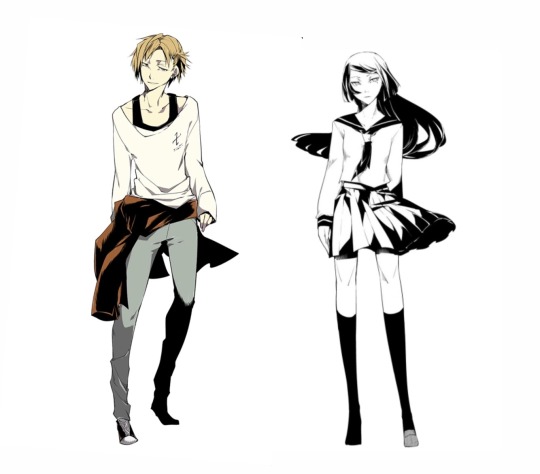
their eye shapes are purposely different
their color palettes are contrasting
even their differing styles of clothing have meaning
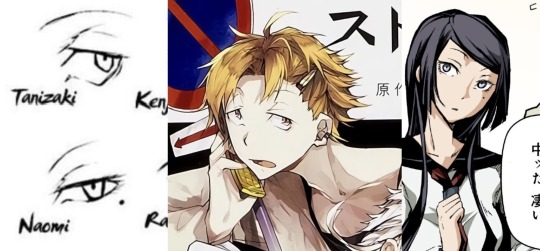
this was all done so that the audience could PLAINLY see that they’re not related— so that WE know that they’re lying when they say they ARE related
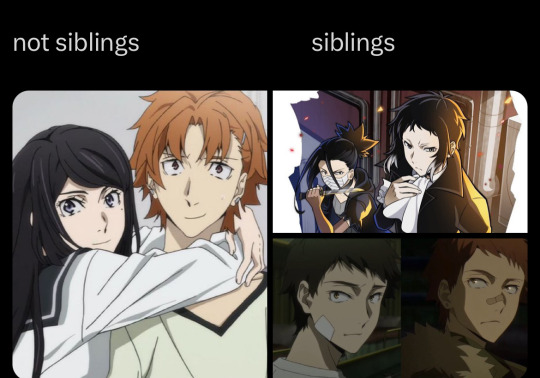
2. how the people around them respond to their act.
the general reaction is “don’t question it”— which is exactly what they want. “be distracted by how uncomfortable you feel so that you look away from what we’re hiding” (this is likely a protective measure)
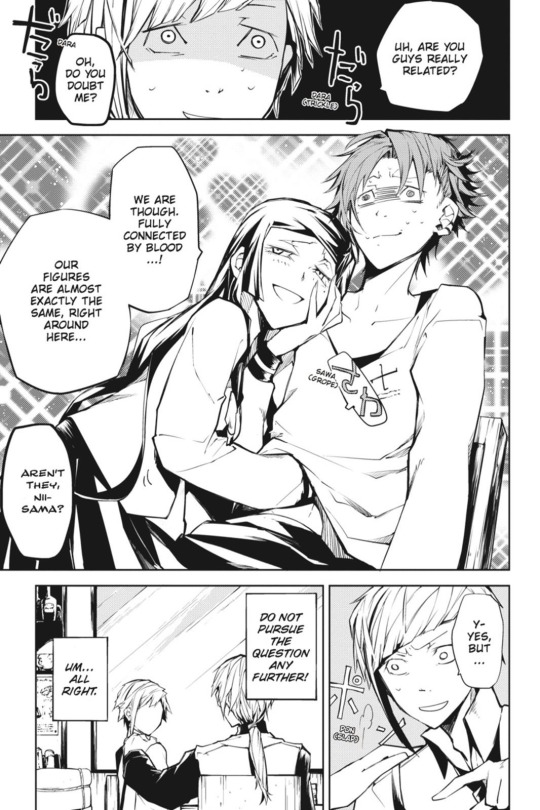
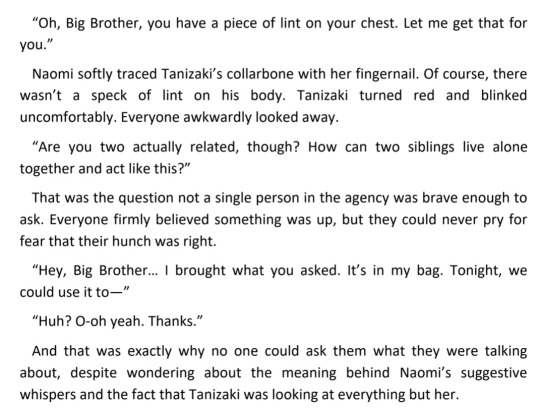
3. most importantly, this is meant to parallel irl Tanizaki’s book “Naomi,” where the main character Joji picks up Naomi to raise her into his ideal woman, but since she's so young (& a minor) they call each other cousins (Joji makes no sexual advances on young Naomi btw)
however, his plan backfires because when Naomi gets older & they get married, she flips the script on him & manipulates HIM so that he's under her thumb (which is why bsd Tanizaki is at a domineering Naomi's mercy). Joji let her have her way because of his masochistic tendencies
4. lastly is the emphasis that Asagiri and the Tanizakis themselves put on calling each other siblings.
over & over, it’s “my brother this” & “my sister that”
like they’re desperately trying to convince us that it’s true (“don’t let your lying eyes deceive you”)
here are just a few of many examples from the light novels…
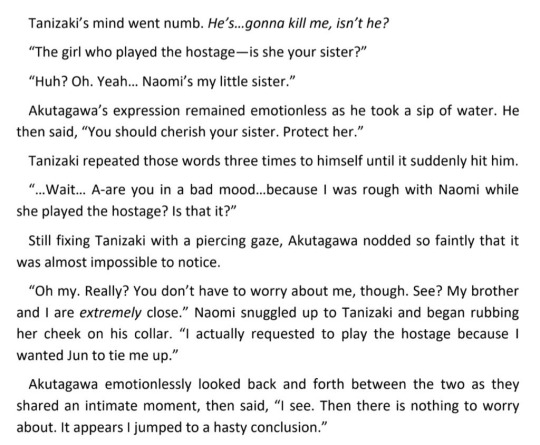

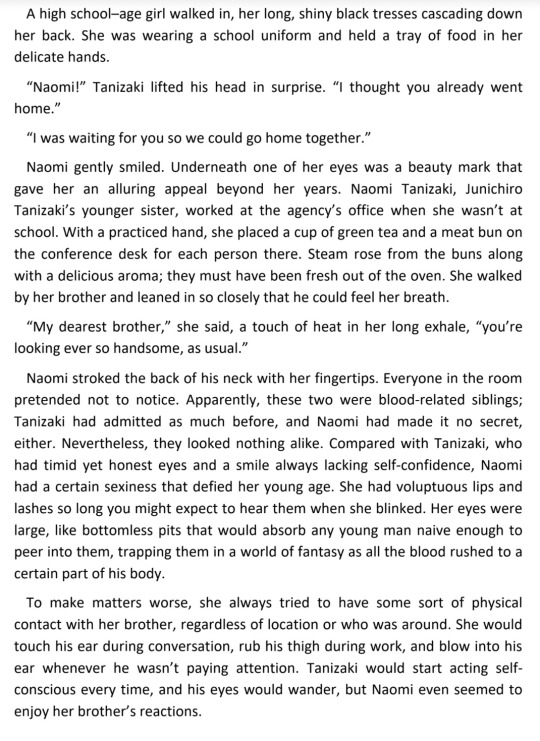
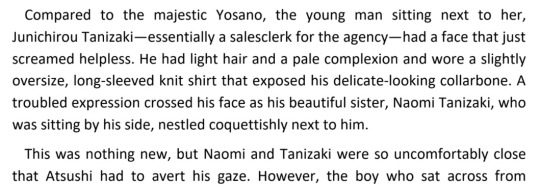
again, if you’ve read “Naomi” you knew that Junichiro & Naomi weren’t siblings as soon as they introduced themselves
just like if you’ve read irl Mori’s works, it’s clear that bsd Mori isn’t a pedophile
just like if you’ve read No Longer Human you know that Dazai’s an unreliable narrator. he makes you think he’s a bad person bc he believes he’s a bad person, but those around him see him differently (btw this doesn’t mean he’s never done anything “bad,” though bsd isn’t about morality— but that’s another discussion)
anyway, i’m so excited for the Tanizakis backstory to be revealed so that we can better understand why they use this defense!!
also let this be a reminder to READ THE LITERATURE if you’re able to!! even reading synopses & analyses of the coordinating books makes bsd make much more sense 🥹
reminder that this how you’re supposed to react while reading bsd:
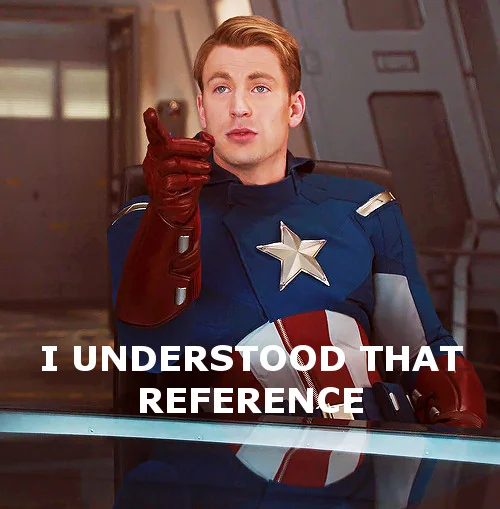
also, if you’re interested in a post explaining how Mori isn’t a pedo, i wrote this analysis on twt. OR you can read this document that one of my moots sent me (remember: analyzing a character does NOT mean you condone any actions they may or may not commit!)
#i hope this makes sense. i’ve had this in the drafts for months but was too scared to post it#i’m hoping now that it’s confirmed canon there won’t be as much backlash ^^’ pls be kind#darcy this is for you… i hope you like it :’)#also full disclosure i haven’t been able to read all of Naomi yet. mostly synopses & analyses. so don’t take my summary of the book as law#also hopefully now people won’t ignore the Tanizakis anymore!! not only are they so interesting. they’re also just fun characters#Naomi is so underrated & intelligent. i need more of her teaming up with Dazai#rambling about bsd again#bsd#bungou stray dogs#bsd meta#bsd analysis#bsd tanizaki#bsd naomi#naomi tanizaki#tanizaki junichirou#tanizaki siblings#bsd 118
907 notes
·
View notes
Text
Falin who cares too much and too little - analysis
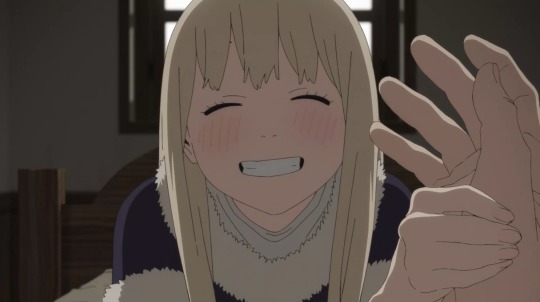
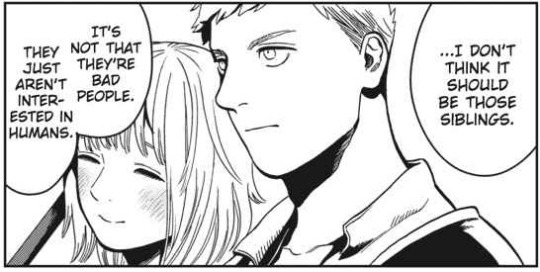
Been stewing on Falin thoughts for a while, I know I have an interpetation on her that differs from many but I’m jumping into the fray. I think there’s a lot to be said about what we do see of Falin. This shorter Falin analysis I made is heavily encouraged prior reading. This analysis mainly explores her complex relationship with caring and so it’s sort of structured in two halves, with Faligon at the crux of it all.
Falin cares too little :
A lot of people assign Falin a people pleasing mindset and I… Don’t agree. We never see her care at all about people in her town or at the academy not liking her.
We do see her worrying about what people think of her… ONCE. And Laios comforted her, told her they didn’t matter and she should be proud of herself. She latched onto that hard. That’s why this scene was so important to be included during the dragon fight, relationship-defining; it’s always been them against the world. She grew to not care what others thought, to only focus on her close loved ones. No one else matters.
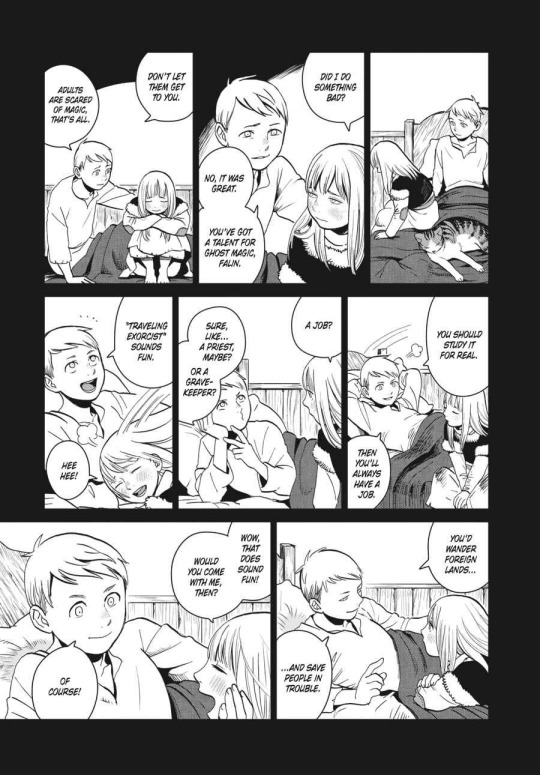
Laios’ words were her world. Her older brother who taught her how to feel comfortable with herself, who told her, you’re great, others are the ones in the wrong to not see that, I’ll always be with you, always be there for you. Older brother who always made great plans, who always knew more, who was better at wrestling to name the dogs, who she has always idolized. Laios who always spoke of traveling the world, to which she always said she wanted to follow. And she would, she’d follow him even if it meant leaving the academy and all she knew behind, she’d follow him to the ends of the world, and that’s what she did.
She didn’t care about showing to her classes or keeping up such appearances, she doesn’t even think of toning down her jumping into bushes when Marcille recoils, etc. She acts like an obedient pawn often, to her parent’s directives and then following Laios around no matter what he decides to do, but I don’t think the motivation is people pleasing, rather it’s being with & caring for her loved ones, and her go-with-the-flow attitude enhances the impression. Not that it’s as simple as that, mind you, but let’s talk about this for now.
Falin is perceived as selfless because we, the audience, have our perspectives revolving around the main people in her life (Laios, Marcille). They’re the ones she’s devoted to and people who care about her back a lot too, but to people like her classmates or the towspeople she probably must have seemed like someone who didn’t care about the people around her or her surroundings a lot, who just went on alone and did her own thing.
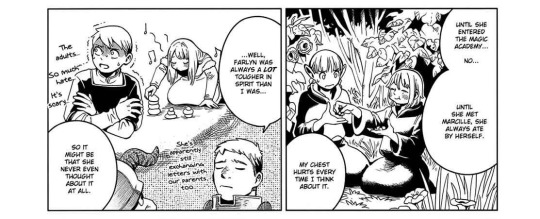
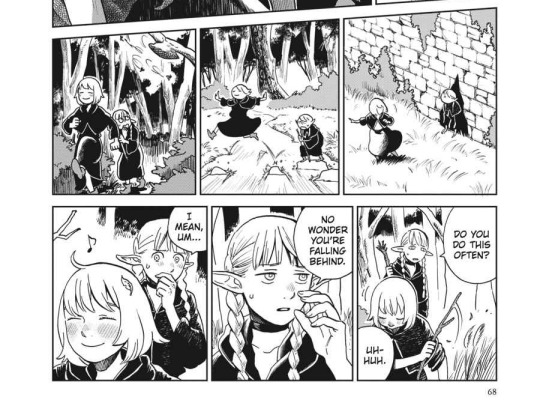
What matters to Falin? From what place does her kindness come from? Is a part of her keeping up appearances? And I think that’s the point, the horror of Faligon as well, that we can’t tell just how in control Falin the person is as the chimera (because we are shown that she’s in there, we just don’t know at what degree), that we don’t know her enough to be able to tell when she’s at her most genuine, her most raw. That even if you do settle on none of her being present as Faligon, we have to at least consider it, consider that she may be able to do something like this and have a part in it, brutal and uncaring. That even the lenses we see her through, the people who love her, may be unreliable.
And this is what’s very interesting about her too, she truly is so idealized by people around her as a saint. She’s so good and kind and caring to everyone etc etc etc. Laios, Toshiro and Marcille all see her as the paragon of goodness in the world. More cynical characters like Namari and Chilchuck have more layered opinions on her, the latter finding her somewhat unnerving because he can’t read her well. But then with that one flashback scene we see that… Her priorities are intensely focused on Laios and Marcille, she doesn’t care all that deeply about anyone other than them (+ maybe her parents). The rest of the party is in the same danger here but only Laios and Marcille who she’s speaking to get the special ,ention, and if they don’t cross her mind then of course she’d be ready to sacrifice strangers through a risky teleportation. That doesn’t make her not kind or caring!! Just that greater good isn’t exactly her priority. Any means is alright if the end result is her loved ones safe, it usually takes the form of healing and caring, but we see she’s ready to fight and make dangerous calls too. To me there’s this aspect to her that she isn’t as pure and magnanimous as everyone thinks she is, both in-world and interestingly enough meta wise as well, and there’s something interesting to that.
People pleasing implies a need to be liked, needs for the motivation to be that. A yes-man, etc. But if we analyze Falin, her general kind, smiling demeanor is more a matter of passivity I yhonk. Conflict avoidance is easier, so she’s friendly and hopefully things’ll be smooth sailing. It’s easy to be kind to classmates even if they act wary and rude if you don’t care about what they think either way. Of course she prefers good things happening to people over bad things, she is genuinely kind, but I think people tend to assign her a very grand altruistic way of life when to her the motivation is pretty self-centered. She doesn’t do what she does because she loves them, but because she loves them.
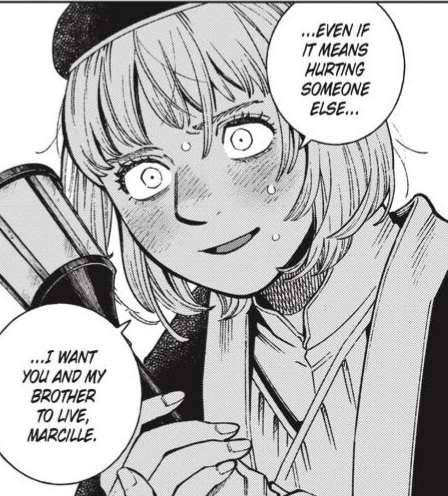
One situation that’s interesting to dig into for her way of thinking, and what I’m trying to get at, is Shuro’s proposal to her. I’ve seen people saying she hesitated because she didn’t feel comfortable saying no even though she wanted to, "I can’t say no, I don’t want to hurt him", something that sounds sensible and familiar, but it’s actually canon in the Adventurer’s Bible that the reverse was the case, that she didn’t feel comfortable saying yes. Because the offer was tempting, but it’d have been a loveless agreement on her end. And it makes sense she’d want to say yes too, like we see with the Toudens, marriage is very much a political strategical economical thing in their village, there’s even a bit on it on Laios’ Adventurer’s Bible profile about dowries, and both siblings were engaged very early. They lived poorly for a long time, it’s an enticing idea to marry rich, to have not only yours but your brother’s needs met forevermore easily, which at one point in their careers was their main worry and goal. Why shouldn’t she accept a life of leisure and wealth handed to her by a lovely friend?
So her hesitance was "yeah that’s convenient for me, but where it’s everything to him and heartfelt I’m able to be detached because I don’t care about it that much… Can I do that? I’m not reciprocating, not saying yes in the way that matters. Can I do that to him?" Very caring even though it’s not what you’d expect, isn’t it?
And central to my analysis, where I’m going with this is, I feel like that’s the thing with her character, that she doesn’t feel as strongly as she "should" sometimes, or feels a different way than she "should", or at least that she feels that way and others say she does. She didn’t mind suddenly leaving the academy, leaving Marcille behind and not seeing her for 4 years. She acted like it was no big deal that she sacrificed herself after getting resurrected after the red dragon fight. And in both those cases it upset the people around her greatly that she didn’t seem to get why it was such a big deal, didn’t seem to care about how they’d experienced her choices.
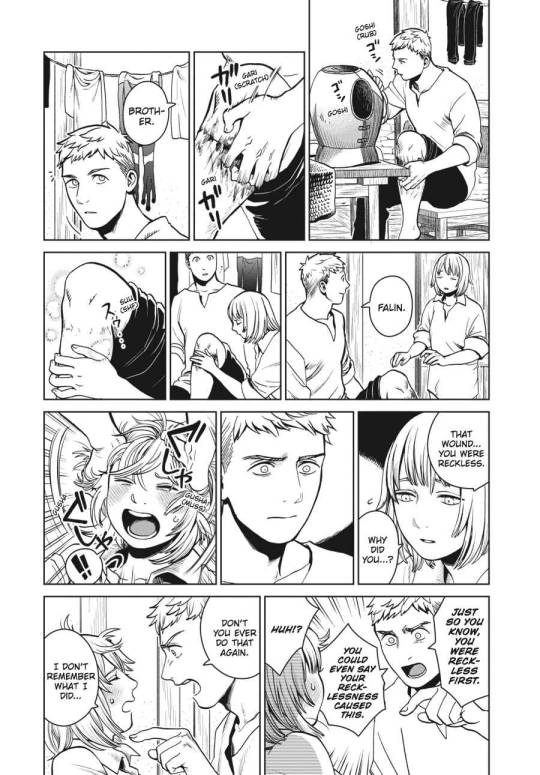
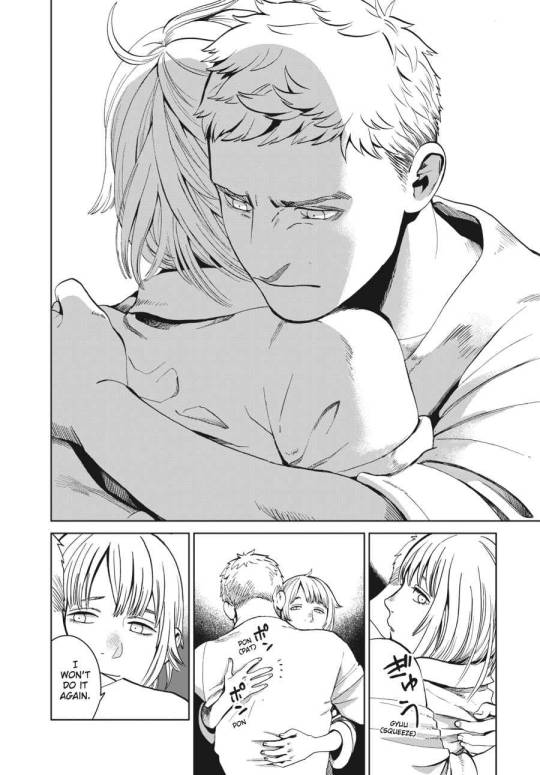
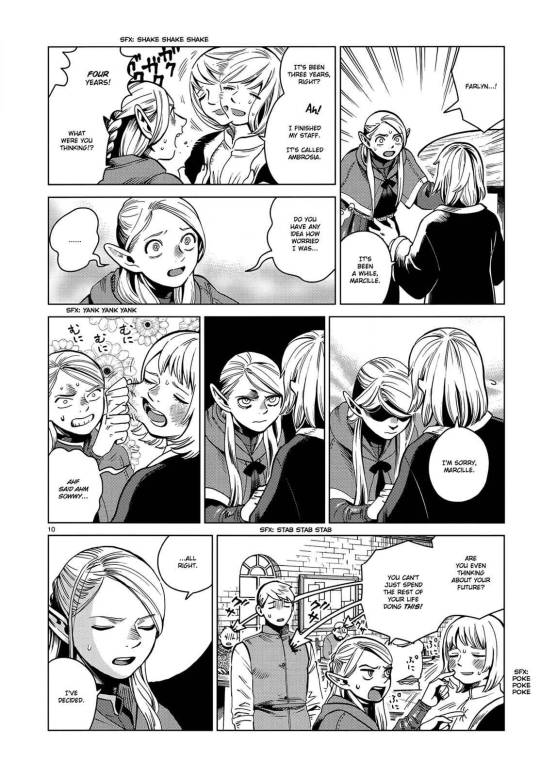
So it’s a tendency… And it’s not that she doesn’t care, it’s just that the way she measures what’s good for the ones she loves isn’t the same as what they themselves think it is (like Laios and Marcille not wanting to be apart from her). It’s an overt but quiet kind of care, it’s doing things like following them around and making sure they bathe and have a meal, even if that means she has to be dragged into misery too.
So yes she probably would know "not caring enough/the right way" is one of her perceived flaws, and that informs how she tries to handle her response to Shuro’s proposal. Her not wanting to accept like her first gut instinct, is because she’s thinking about reciprocity, about if it’d be right to go into this knowing that they have different priorities and she might not be able to keep up with the type and amount of emotions he wants/expects from her. And that’s a big part of her character isn’t it, having expectations pushed onto her. Her trying her best, but in her own way that may seem odd or even unfeeling. Not unlike when she exorcised the ghost as a kid too, unblinking and matter-of-factly, and not seeming to understand why people stared the way they did.
Even though she answered his proposal only post-canon, she’d been pondering it for a while even pre-canon and the Adventurer’s Bible explanation was released midstory, so I’m hesitant to assign her much growth about her hesitation and what I went on above, since she still didn’t react "right" with Laios after the red dragon fight (even if she apparently doesn’t remember sacrificing herself) and put herself in that situation in the first place. She hasn’t finished her arc on that flaw of hers is what I’m saying, she for sure still has it, but I certainly think her thoughts on Shuro’s proposal shows awareness, both of herself and social.
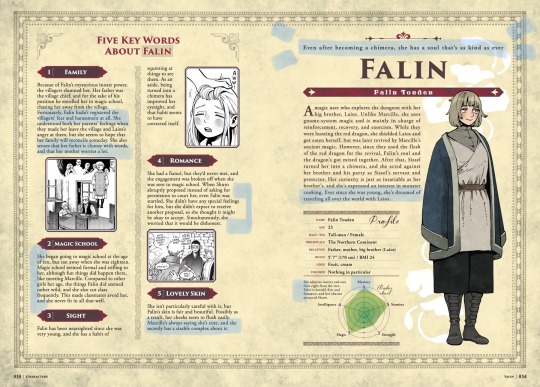
And awareness is a big analysis key word with Falin, especially here it can be hard not to conflate not caring with not knowing. How socially aware is she? It’s rather layered, because canonically she wasn’t aware of her ostracization in her hometown at all, and we’re not sure if she knew Shuro was interested in her before he proposed, but she generally seems more socially aware than Laios. She tags along on his caravan job to make sure he isn’t being mistreated (though doesn’t ask he get a salary), she catches social faux-pas more easily like in the genderbend magic mirror omake with Shuro, and interestingly enough she’s very good at empathizing with her parents and understanding their perspective. We see when she’s worried about Marcille coming that she does know about propriety and how appearances shape impressions. Being a chief’s daughter must at least have taught her a thing or two on that front.
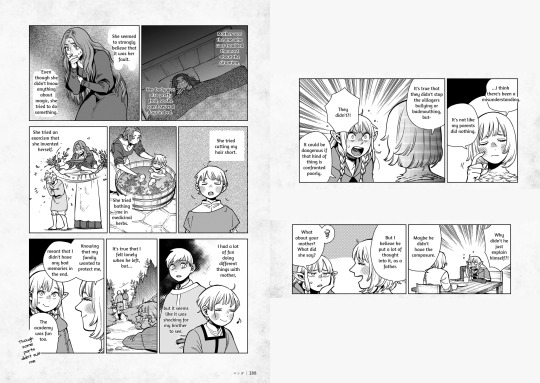
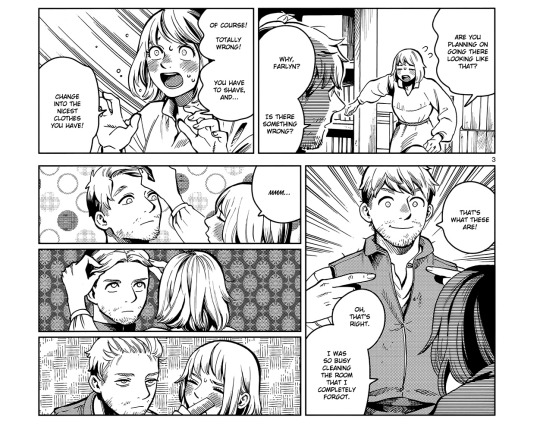
She never stands up for herself, but when it comes to defending others she worries, strategizes and explains.
And this sort of understanding is part of why I think she’d notice the expectations pushed onto her like I was saying earlier, notice how she makes people feel when she’s careless. But if she changes anything about herself in response to noticing is for her to choose, and generally I think it’s a sort of inbetween of yes and no: that she becomes more complacent but also more reserved, complying but by hiding more of herself passively. She’s not sure wether to accept or reject Shuro’s proposal, doesn’t want to lead him on? She’ll just be taking a while to silently consider it, try to keep things as they are for the time being. The third, less conflicting option. She doesn’t feel heard by Marcille who keeps infantilizing her? Just bear with it. Retract yourself emotionally. Settle for it.
We see that when she was young she had a tendency to not read a room, and I think that’s here too. She doesn’t get why her nonchalance upset others but that doesn’t change that she doesn’t want them upset or hurt, so she tries, albeit in maybe a roundabout way. She always had a hard time deeply connecting with people, often keeping herself some amount of emotionally distant: erasing herself from the equation, from the two-way trade that relationships are and making it a onesided thing instead, where all their needs and emotions are directed towards her but she only lets out a bit of her own show. She takes everything upon her and deals with it and tries not to give others this same burden, though not on a conscious level, it’s just that she’s learned growing up that she doesn’t have much agency.
Like I went into with my analysis linked at the beginning, I think Falin is used to just taking what she can get and not asking for more, when it comes to social bonds. She’ll take spending time with her mother no matter what it is they do, she’ll follow Laios to the graveyards and stick by him even when he’s pushing her away (because he doesn’t want her borrowing his book or "No copying!" or such). Her father was always distant, cold and uncommunicative, her mother was considered sick from anxiety and the exorcism attempts were the main way they spent time together, at dinner tables there were only her and Laios. The dogs picked on her too even if she loved them— And so did the townspeople, maybe that being normal to her at home is why she didn’t notice the ostracization she suffered.
She’s always been the last to be asked about decisions or what she wants, never asked to play with at recess, neither her father or Laios asked before sending her to the academy or leaving the village. At home, in the hierarchy she was considered to be below the dogs by the dogs themselves, as someone they can disrespect. Dogs learn from example and behavior, so this means Falin must have been pushed around a lot, and that the family didn’t try hard to rectify the dogs’ misconception, likely worsened by Laios regularly wrestling with her as a competition.
So for example when Falin showed Marcille food, it was her way to implicitly ask to have lunch with her without voicing that question, without daring to take up space. Someone’s presence isn’t something you ask for, it’s something that’s bestowed upon you, you can follow them around but you can’t ask them to stay or to come with.
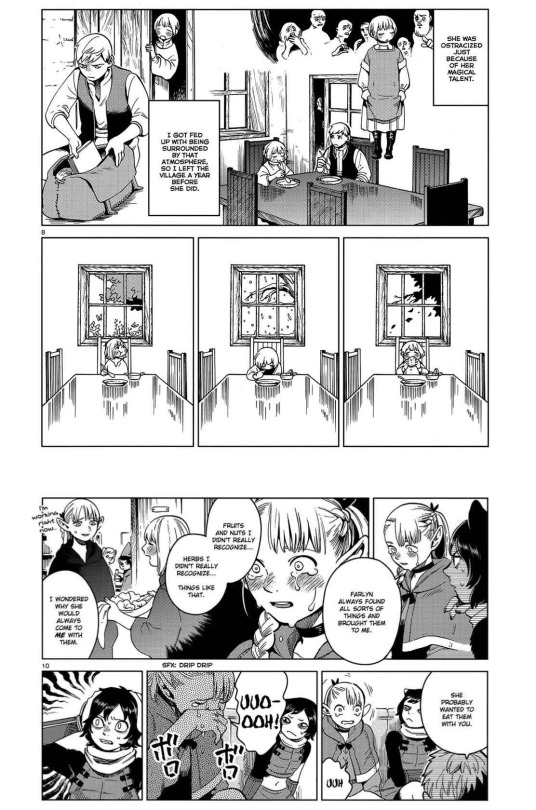
She’s used to her needs and wants not being listened to, so she’s learned to have less wants. Caring less about herself, caring less about other people beyond her safe zone, was a defense mechanism in part. She has a sense of learned helplessness too, like how when Marcille came to take her away from Laios, even though she didn’t want to leave with Marcille it felt so determined and unshakable to her that whatever Marcille decided Falin would have to comply with.
And still, it’s the "marrying you would be awfully convenient if it wasn’t that I’d feel guilty for not loving you back, the way you wanted me to when you proposed to me" and the "I don’t regret leaving the academy and leaving you behind without goodbyes but I’m sorry that you’re so much more upset about it than me". It’s the guilt of not loving people back the way they want to be, with the same intensity or fervor.
It’s the autism it’s the aroace of it all, it’s the emotional stunting and confusion but the pit in your stomach telling you you did something wrong again. The no object permanence even for people you love even for 4 years, it’s the feeling like you’re somehow at fault for someone having fallen for you and not knowing what to do with any of it. I’m not joking btw it isn’t uncommon for autistic people to not see their close friends for a long while, not having missed them all that much and for that to be really hurtful for the other if they notice/ask about it. "Hiii bestie! Oh umm you’re uh more emotional about this than I expected, hopefully you won’t feel alienated by me not feeling as intensely about it…"
So… Yeah. I think she thinks of things and relationships in a different way than most people, and beyond "good things happening to people is good" I don’t think she actually cares about people all that much. I’d argue that Laios shows more desire to connect with others and make relationships. And just like with Laios and his own issues with humans, that doesn’t mean her kindness is a lie or ungenuine or worthless! It just means that like, well it’s pretty straightforward really, she’s not all that social and doesn’t see casual bonds as meaning all that much and whatnot. She does want to see people happy, but it’s not as much like… A conviction or goal. She’s too laser focused on a select few people. "It’s not that they’re bad people, they just aren’t interested in humans."
And sometimes it feels like people get defensive about Falin in a meta way too, like if you ever so much as imply Marcille isn’t her whole world or that she isn’t the kindest soul out there then you’re saying she doesn’t care at all or she’s evil. And that’s actualy exactly the sort of vibe I wanted to get through with my analysis above here actually haha, that she does care and she is kind but it’s not in a way that’s quantified or understood in a way that makes people feel comfortable. In a way, that makes people feel insecure because they don’t have the same logic as her, don’t show love the same. And I think this is another stellar depiction of autism, of parts of it that feels unpalatable to many, if I’m making sense. The fandom idealizes her as well, which isn’t uncommon or surprising for the character embodying the trope of the perfect beloved to rescue.
And disclaimer, as I said in the tags I feel like the details of Falin are pretty vibe based when it comes to analysis, there’s absolutely a valid angle where she does super care about everyone always, feel free to disagree with me on the overarching angle of my analysis. There’s enough supporting evidence to tip the balance either way I think, and the reason I’ve chosen this angle is I feel it’s more compelling for the themes in Dunmeshi of idealization and being different, of desires vs wants, and because I think it neatly ties up Falin’s character arc as I’ll go over throughout the next section…
So.
Not feeling as much as she should. And……. Is this not Faligon pushed to the max?
You can’t tie down a dragon. As the chimera, she gets to just not care about everyone else and be on her merry way.
Part of it I think is finding comfort and freedom in the mindlessness, in not having the burden of feelings and connections and a consciousness (despite still ending up seeking those in a stranger, Thistle). Like when she’s dead in the purgatory as well, she gets to just… Hang around and do whatever. Similarly to when she played in the forest instead of going to class in her academy days. That’s what freedom and peace of mind looks like to her. Why she decides to roam post-canon, if only now with the goal to find herself instead, with her mind in tow and somewhere to go back home to.
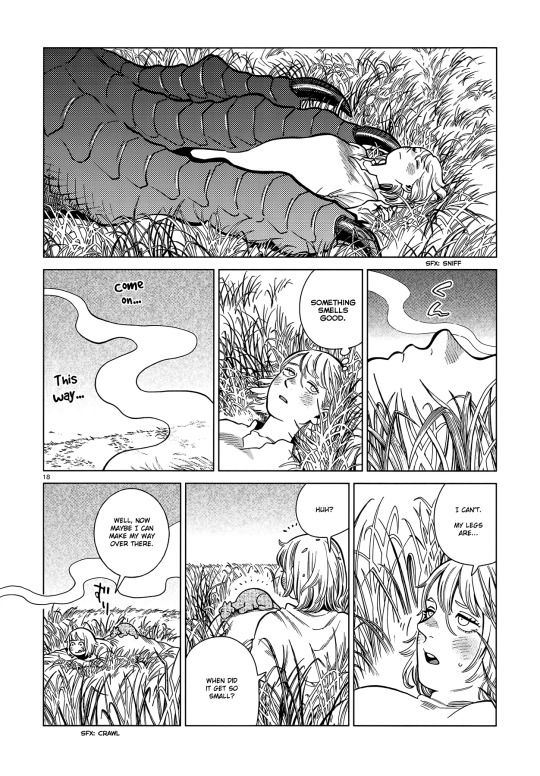
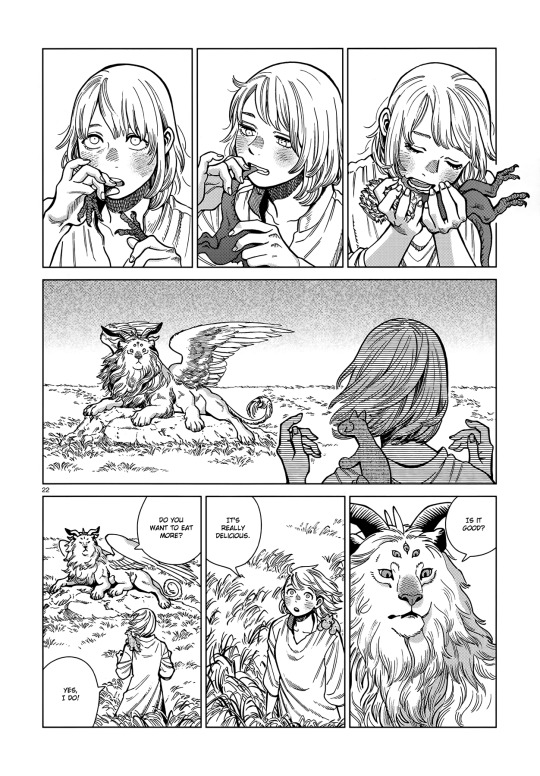
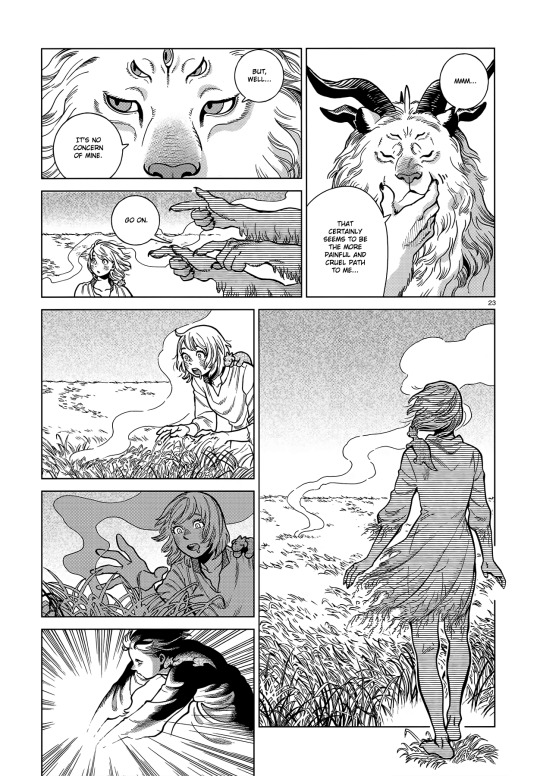
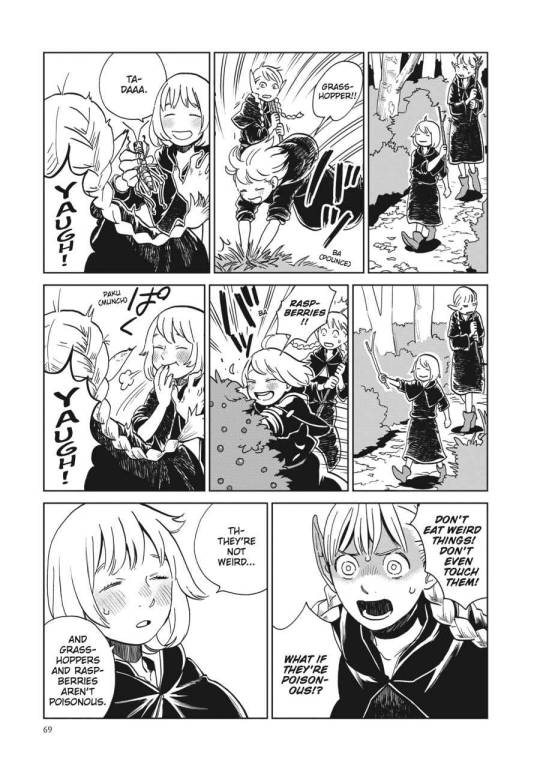
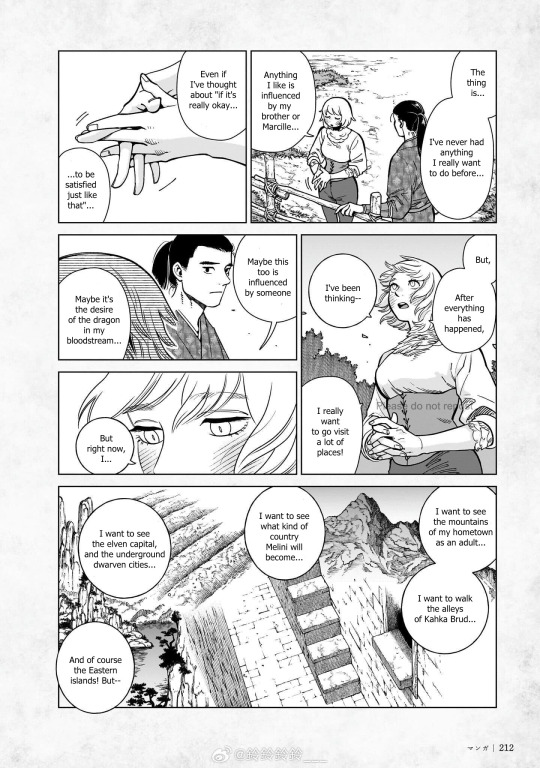
There’s excellent analytic framing out there about how of course, Dungeon Meshi has a big theme of grief and letting go, and… Falin was always a symbol narratively, idealized by characters and often underconsidered by them despite their love. It was Falin’s choice to sacrifice herself for Laios, she thought it was worth it, knowing that it would be her end. Her resurrection and the process of it intertwining her soul with a dragon’s wasn’t done with her consent, and the subsequent opening it gave her to become a chimera puppet. She’s stripped of her agency consistently, and so… It’s very noteworthy that the final choice, of wether to go back to life or to stay dead, in that purgatory scene, was up to her. And she chooses life, but I do think about her in those fields and how at home she seemed there. Peaceful, by herself in a vast calm expanse she could explore, free.
Personally, I think freedom is Falin’s own subconscious selfish desire. And though to us becoming the chimera is obviously a shackle, I think it felt like freedom to her somewhat, too.
And if you think I’m going wildly off the rails here I want to talk about Laios’ wish of becoming a monster. And to be clear before getting into it, being mentally a monster is absolutely a big part of the appeal for Laios, it’s something that’s consistently referred to, something especially pointed out in the werewolf monster tidbit with Lycion. Right panel is from that, but left panel is from the extra with Izutsumi where Lycion talks about suppressing souls in a beastkin body, the human or the beast soul.
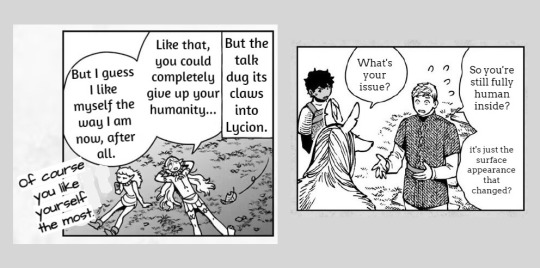
Finding comfort and freedom in being mindless, less sentient, less aware? While being unaware in her hometown might have saved Falin a lot of heartache although perhaps stunted her emotional growth, it’s always been Laios’ curse.
Actively, through his choices, he seeks to grow closer to people, to form deeper bonds, to understand and be undertood, but… On a deep seated level, what he desires is to leave humanity and civilization behind. He has an irrational hatred for humans, born from the trauma of ostracization, being different, being beaten up and rejected consistently through his life. Running away from problems is easier. He wants to be free from being a social animal from a social species who has deemed him the black sheep, he thinks it’d be simpler to just leave it all behind, people and his own humanity. At its core, to Laios becoming a monster is a power fantasy, a coping daydream of "if only I could be strong enough to never be hurt again, the power to destroy anything I want, the power to go somewhere better, if only it was possible for me to never feel hurt again. If only I could be someone, something, that can never be hurt". "If there’s someone you don’t like, you can gobble ‘em up in one bite. If you could fly, you’d be able to leave this village right now." It’s a childhood fantasy, from a deep sense of being misplaced and a desire to be able to stand fearless, thinly covering up resentment that Laios represses.
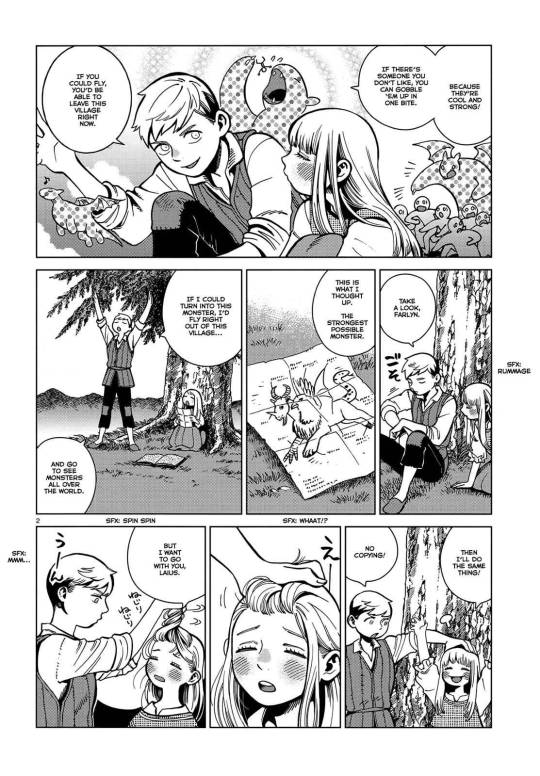
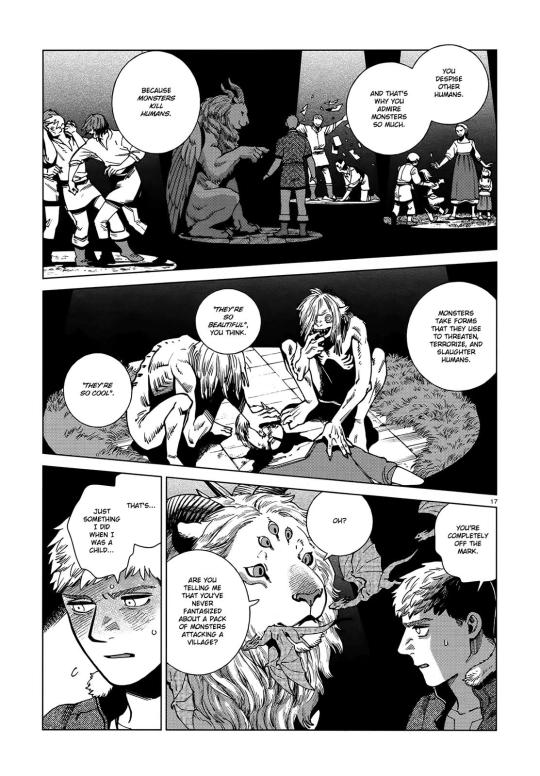
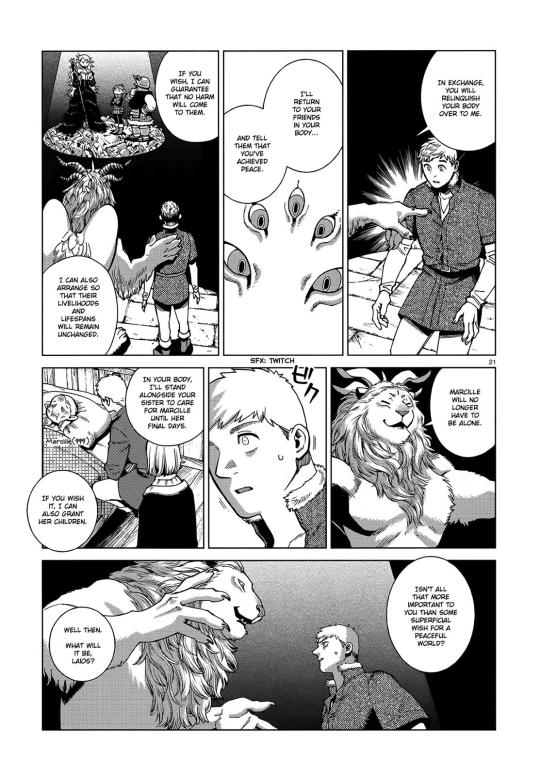
But you’ll notice, when the Winged Lion is enticing him in the last page, even now with his lifelong wish of becoming a monster on a silver plate, he still cares about his friends. He still has that sense of responsibility to his friends, doesn’t want to leave knowing they’ll be in danger and alone. The offer that his friends may be left unharmed is already good, but Laios also visibly flinches when the Winged Lion offers to specifically care after Marcille and rid her of her biggest fear. Laios’ care runs that deep. Not unlike with the succubus, he resists temptation until he gets reassured that everyone will be okay. But see, what he desires isn’t to stand alongside Marcille until her last days, it isn’t to stay and see how well his friends will live, it’s to go. It’s to leave. It’s to fly away, a monster both in body and mind. He wants to be free from caring here, wants to not have to worry about his friends, wants to just go do his own thing, but for that he needs to feel safe in the belief that said friends will be safe even without him being there to see it, because despite everything else he cares, he does. It’s again that dichotomy about caring and wishing you didn’t, or not caring and wishing you did.
In the end, it’s Falin who achieves that wish. Both by becoming a chimera during canon, and by going traveling post-canon. In the latter, being both free of human relationships as something chaining you while still being uplifted by them, by the knowledge that there are people out there you love and that love you. It’s a theme that can also be connected with Marcille, because she gets anxious over people she loves getting out of her sight, worrying they’ll get themselves killed, that time is passing while they’re away from her. But before she can get to the point where she can both have her freedom and being uplifted by her social bonds, regaining both her individuality and her connections, she has to get a taste of just one at a time. Before they can find balance in her life, she has to see what it’s like to have what she’s never had on its own. Unapologetic freedom, and power.
No one can blame you for not caring enough or caring right if you’re a fricking dragon!!!! You make the rules when you’re a beast and you can just… Fly away. From anywhere, from anything. And if a dog bites you you can just crush it. Instead of being pushed around by the dogs because you’re at the bottom of the hierarchy, you’re now at the top, the one with the power to be heard and do what you want without consequences.
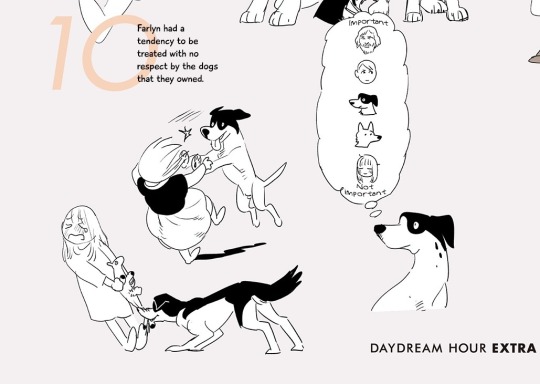
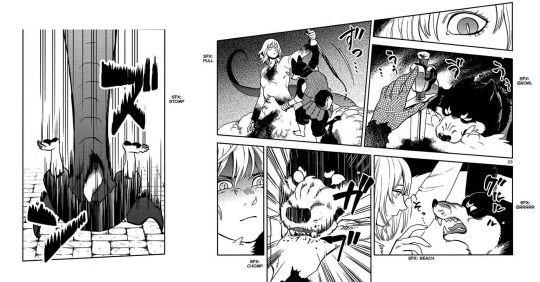
I think she’s on autopilot. I think she’s on autopilot a lot of the time, even before being a chimera, and it’s partly why her will is so weak compared to regular dragons. (Again, read my shorter analysis.) It’s familiar to slip back into the role of following someone around unquestioningly. And that’s what is weaponized when she’s a chimera, that instinct she’s been nursing all her life to unconditionally support, defend and follow someone. Only now, that someone doesn’t matter in itself, only the symbol of it. She doesn’t mind, either way is fine. Her will is weak after all, because she’s trained it to take as little place as it could.
Falin cares too much
She spends all her time caring for Laios and Marcille alternating that none of her care and emotional energy is left for others, including herself. So she had to get relieved of all of that for a bit, becoming the chimera so she could reset and recenter and remember that she, too, indeed, is there and an important part of her own life.
So you’re probably seeing the duality I’m talking about here, Falin is very self-sacrificial but for specific people in ways that they often don’t recognize or appreciate. She cares but selectively, both in people, putting all her eggs in the same baskets, and in the ways she cares after them. She doesn’t care a lot, but when she does she cares a lot. Falin doesn't have a lot of earthly attachments, but when she does, they're her world.
In canon her arc, especially post-canon, is to grow beyond Marcille and Laios. Her caring for her close loved ones held her back from looking after her own self-fulfillment needs. And this is what I mean when I say she cares too much; she could gain from caring more about the world besides Laios and Marcille, both lands wise and people wise. She cares too little, but her arc centers her flaw around caring too much instead. Her pitfalls that Kui highlight over the course of the story, while of course her selflessness is appreciated for how she saved Laios and everyone, on a personal level is shown to be self-effacing and damaging. She’s undermined by Marcille, without the courage to voice her thoughts and wants, she would dedicate her whole life to Laios. And I mean, it’s text, in the response to Shuro’s proposal extra no less. And she’s so laser focused on her most loved people that she’s fine with being callous and risking others’ lives, even.
Post-canon, she needs to leave to find herself, away from them.
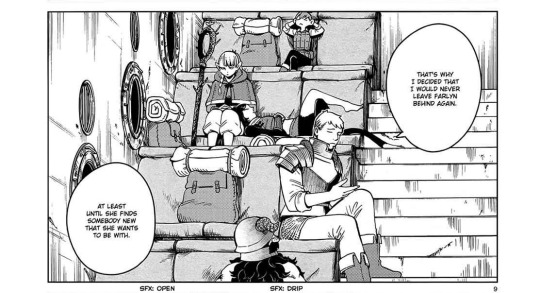
Herself. What if she wants to just be with herself for a while.
And this is me reaching but I feel like, not unlike Izutsumi who learns to feel this sense of never being alone, always having someone on your side what with having two souls, the dragon in her would make her consider herself more. She finds it easier to care after other people after all, and in the purgatory fields sequence she takes care to bring the bit of dragon left with her… Not unlike with Izutsumi, having two souls forces you to think about your identity and figure yourself out. Besides being this sort of duo now, where if she wants to care after herself she can channel it to that other side of her too… In meta dragons are symbols of greed, and I think the bit of dragon would push her to want more and listen more to her desires, primal and self-serving as they might be. The dragon soul which warped her human body with feathers and draconic features, her image of perfection marred, her weirdness externalized in a way that’s not palatable. But she doesn’t care, about if her appearance is palatable for most people, she hasn’t for a while now, and that’s great.
Notes & nuance
I’m struggling with the structure of this post, making my points organized, concise and strong at once. It’s difficult to make any statement without going "things are generally like this, but there’s this time that this contradicting thing happened too" or "it’s ambiguous enough that you should just follow my interpretation for the time of this analysis" haha, so this is the pit where I put all the stuff that wouldn’t fit well in other places but are interesting for Falin’s character. This section is pretty separate from the main thesis of the post, it’s just more Falin observations. The post has reached the 30 pics limit so I can’t just pull it up whenever it’s relevant but I really encourage scrolling up to read the stuff I highlighted in her Adventurer’s Bible profile if you haven’t already.
I think with the shy-looking loner type autistic kid archetype, and knowing she didn’t seem to mind others ostracizing her, it’s easy to lose sight of how she was by no means an unemotional child. In all the bits we see of her as a kid she’s bursting with energy and emotions. Canon confirms Laios leaving the village did affect her and make her lonely and she cried a lot, too. She may not be social in the traditional sense, but she was clingy with her brother, and she also never was all that shy about who she was, wearing her heart on her sleeve.And okay. Okay okay okay. Speaking of appearances. About what I said of her not caring about what people think of her, even seeming defiant with the caravan leader… There’s one istanxe of her caring actually, and it’s about how her face blushes easily. I remembered it as being because Laios’ said it and as I rambled Laios’ words are her world, but actually it’s ambiguous. It’s only Marcille imagining up this scenario where Laios says Falin looks weird because of it, there’s no evidence Laios said or thought that at any point. And on the other hand…
Her Adventurer’s Bible says: "5, Lovely Skin. She isn't particularly careful with it, but Falin's skin is fair and beautiful. Possibly as a result, her cheeks seem to flush easily. Marcille's always saying she's cute, and she secretly has a sizable complex about it." The phrasing makes me think the complex she has over her blushing might have developed because of Marcille more than Laios. "Marcille's always saying she's cute, and she secretly has a sizable complex about it." It could be related to how Marcille gets swept away and infantilizes her, calling her cute wanting her to wear cute feminine outfits etc. Again this feels like it relates to Falin’s struggle to be seen for who she is and what she wants to be seen as, her struggle to be recognized, having ideals and perspectives pushed onto her. Here Falin is insecure over her blushing implicitly because she doesn’t like being called cute over it, but that’s not how she wants people to see her. She doesn’t want Marcille to always see her as her 10 years old adorable friend. Like if your friend said you had puppy energy, it can be flattering, but it can also make you insecure.
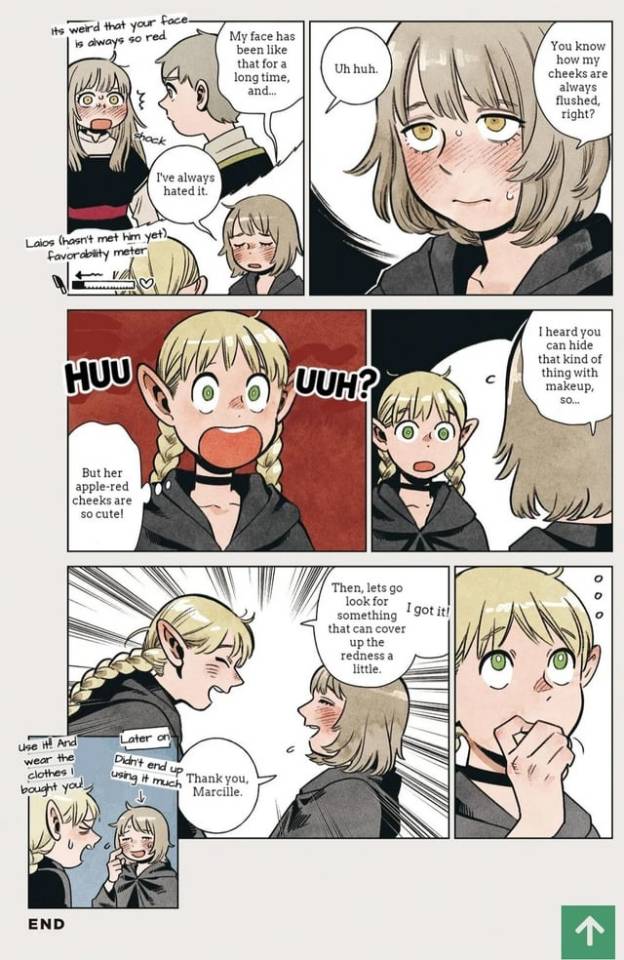
Here’s a link to what I mentioned about her being uncomfortable wearing feminine outfits. It does seem to be more about comfort than the aesthetic perse, to me. Interestingly the shirt & shorts don’t seem like they show much more skin than her beach outfit, so maybe it’s more about the shirt and shorts being tight-fitting. Like the skirts and heels they feel stifling. Again a bit with themes of freedom and not wanting an aesthetic pushed onto her. So yes just to reiterate, I think this is more about self-affirmation and how her identity and self-image gets shown to others, rather than wishing to hide parts of her body like her blushing etc for people pleasing reasons. Makeup was a way for her to appear how she wants to and feel more confident. It was a way to take control over her own image. She didn’t keep doing it, the narrator stating the process to be ‘troublesome’. Ultimately she still prioritizes her comfort, and it was a lot of recurring efforts to go through.
And on the topic of appearances… A friend once asked me: "Does she really hide herself or not? I keep thinking about "falin is herself first and foremost" (in her Adventurer’s Bible profile) it’s just so. Hmmmmmmmm... I just keep seeing people say she hides her real self from people when I feel like the issue is more about her charitable traits straying too far into becoming flaws but people around her dont realize that..."
Imo the thing is, I don’t think she hides her identity, but I do think she suppresses her individuality for others’ sakes if that makes sense. In the way that only post-canon does she allows herself to go see what the world is like, but that’s not personality wise it’s needs and wants wise. And I do feel like that’s the closest interpretation of canon, she says it herself she doesn’t know what she wants because everything she’s done was always about Laios or Marcille, but she doesn’t change her demeanor or personality for others. But she *will*, like, not ask for things she wants directly, like sharing lunches with Marcille at the academy, she suppresses her wants, doesn’t ask things from people and doesn’t hope for more, hope for better. I don’t think we ever see her actively repress her personality, except like what, being more laidback than enthusiastic but I do feel like unlike Laios with her it’s less ‘appearing stoic to fit in more’ and more ‘yeah i’ll just chill until I’m needed or something activates my enthusiasm’. To which said friend quoted: "to feel like you belong you need to be useful. when you can’t be useful the next best thing is being convenient."
And speaking of passivity… I want to speculate about Shuro’s proposal some more. Shuro and her got along well though we don’t know how much, or how often they hung out, she even saved him from a nightmare. Why did she take so long answering Shuro’s proposal? Was it an effort to preserve or was she really just that conflicted? Procrastination probably yes, but what is the core motivation of itl Considering she ended up saying no to travel the world instead, I don’t think it was as simple as ‘she wanted to say yes for convenience’. Logically it’s what would have been best, but it’s not what she wanted for herself, but it was and still is hard for her to even know what she wants. Probably, since like she states it was a great offer and she doesn’t think she’ll get proposed to again, it’s that self-effacing tendency that yes it’d be convenient and logical, and that makes her want to say yes even if her spirit isn’t in it, because if it’s convenient then that’s more important than her feelings on the matter. Man also… Obviously Marcille is very vocal about how she shouldn’t get with Shuro, but imagine how Falin’s whole perspective on marriage must have felt when her only friend ever is a Romantic with a capital R who gushes about idealized romances and grand gestures and True Love and doing things with fully pure feelings all the time.
AND speaking of passivity!!! How much Falin is "there" as the chimera, just how much she’s master of her actions, is left ambiguous and intentionally so imo, but she’s for sure there & influencing the dragon’s action to some degree. Having a dragon’s foot on her in purgatory that keeps her from moving for sure visualizes how it must have been like, but there’s Falin calling out to her brother Laios, there’s the kind attentions towards Thistle that are so Falin-like, and most explicitly there’s the Adventurer’s Bible stating "Even after becoming a chimera, she has a soul that's as kind as ever", which I honestly dislike, a fantranslation puts it as "Even as the chimera, her caring nature remains" and either way to me it feels like confirmation that it’s her giving those berries to Thistle. Now, wether or not she has the mental capacity of a chicken or something closer to human Falin, no clue, there has to at least be some kind of mind bond between monsters and the dungeon lord, compelling or forcing them to go along with orders, or calling her to him in distress like with the fight on the first floor. But yes, it’s interesting to wonder what it is that a Falin, with her kind soul but without her human mind, would willingly do. On her profile, she’s described as Thistle’s guardian and servant. The power dynamic between the two are very interesting, I already went into how it might have felt like freedom to her while being fake so I’ll reign myself in and just mention it again. She’s still at the heel of someone, only now it’s someone who doesn’t care about her back. Going from being cared for so strongly that it’s suffocating and they would defy death and the world for you, to being devoted to someone who has not one feeling about you besides your utility as a paw . She has all this care to give and to focus onto others and he has none to send back to her and I think that’s part of it. In a way, being left with only her own feelings and a void, without expectations or feelings or ideals pushed onto her, it might have been soothing in itself, and eye opening. But yes the way I think of it, her care for Thistle isn’t unlike the care she gives the ghosts.
Interestingly, the care she extends for the ghosts is sending their soul to a peaceful death, freeing them, of life and any earthly attachment. Take that as you will with the themes of freedom and burden of life and mind, immortality and becoming a warped version of who you were, and such and such.
But going back on the topic of connections and bonds for a bit, I think academy days Falin & Marcille is super interesting bc we’ve never really see Falin form a connection besides with Marcille and even that is kept pretty ambiguous. When was the point that Falin started seeing Marcille as a friend and seeking her out? When was the "I’ll lay down my life for you" point? I’m so fascinated by how she wanted to share lunches with Marcille but never truly asked, only made little "hey want this? I found it isn’t it cool?" gestures of showing things to her… It’s the only way she knows to ask, or maybe it’s the only way she feels comfortable to. In all the scenes of young Falin and Marcille Falin seems comfortable in her friendship with Marcille, but at the same time… I think we see Falin at her most insecure around Marcille, because she really does care about Marcille and what she thinks of her so much, and while Marcille is a bit of an unstoppable force tornado style (affectionate) Falin is something of a doormat. I’d usually say showing her berries was her earnest way to connect and be like "Hey bestie look at this! :]" , but there’s a real possibility that she was self-conscious and holding herself back.
Friendship and Marcille! Involving Laios into this too but, again with the autism thing of not showing you care in ways that others understand, Marcille being very overtly affectionate and clingy was so so soo important… Marcille keeping on hanging out with Falin and caring after her, and being undeterred/unbothered by Falin not always seeming like she cares all that much back in the conventional way, as in Falin acts nonchalant and a bit like she didn’t mind wether she was there with her or not during her outings to the cave dungeon. Caring and being clingy and so affectionate despite that in such a classic Marcille way is soo needed, because so often people will get discouraged by say, their friend not keeping in contact regularly/well, seeming disaffected or as happy-go-lucky as ever even if you haven’t seen each other in a while or when they’re alone, and yes there’s potential for a strong friendship there but someone like Falin won’t be committed enough to reciprocating attention the same way… I hope I’m making sense but yes this angle in particular strongly correlates to autism. And the way Marcille always initiates physical affection, both Toudens being awkward about initiating touch because they don’t know if that’s allowed, if they’re going about the social interaction the right way, if they’re allowed to ask that out of someone…
Another fun observation to make is about the 4 years Falin and Marcille spent apart. Marcille despite being of a long-lived race treated these 4 years of separation with more gravity than Falin did. Falin brushed it off very dismissively to say the least. But then you remember that the amount of time Falin and Laios didn’t see each other after he left the village was 8 years. Double the years, double the time. And that reminder makes Falin’s actions so starkingly understandable. Of course she wouldn’t see 4 years of separation as a long time if 8 years of separation with her beloved brother is her point of comparison. Of course she’d see it as worth it to leave Marcille for 4 years if it meant ending those 8 years instead, especially if she was worried about him (the reason why she followed him into his caravan job).
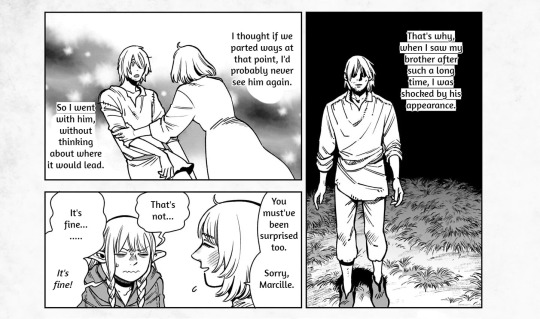
A friend always says that while Falin is the center of Marcille’s world, Laios’ is at the center of Falin’s, and I tend to agree.
It’s fun to think of how her career dreams had always been shaped by Laios, even when they were kids. Of course there’s how traveling the world began as a dream they talked about and shared, but there’s how he reassures her by listing cool jobs she could do like traveling exorcist, etc. And then of course, she gave up on her magic academy and career path to follow him and do odd jobs, etc etc.
I should go into the violence of Faligon more tbh, because I think there’s an interesting parallel to how she has no problem wacking things with a mace, wether a ghost when she was a kid or a walking mushroom as an adult. Something that often surprises fans when they remember, I don’t really want to get into the whole " Falin hates violence and hates seeing people in pain to an intense degree. ‘If you die do it somewhere where I can’t see’ style’ interpretation, it has some weight but on the whole I don’t vibe with the theory she has a particular aversion to violence, she seems to be fine resorting to it as much as any other adventurer as long as it isn’t needlessly against ghosts. And Falin’s sudden mace hits are fun to me too because it’s not her becoming a berserker when the need arises as much as her becoming active because something she cares about is threatened, and that brings her out of her passivity from 99% of the rest of the time. Thistle included. Falin always could be violent, she just dislikes senseless carnage. The Shuro party vs chimera fight is a bit ambiguous on it, because you can argue she only attached after being provoked, presumably offscreen as well while the ninjas went off to fight the harpies. Falin becomes the most active when she needs to protect someone, she has no qualms doing whatever’s needed for that, wether it be leaving the academy & Marcille without notice no matter the consequences or what her parents think, or teleporting the party, etc.
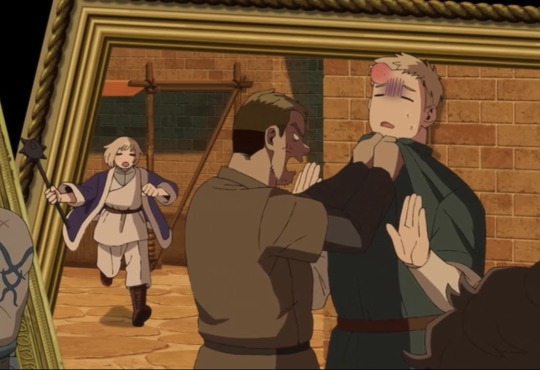
I’m working on a post specifically pointing out all the differences between Falin and Laios, but yes I think both of them selfishly desire freedom in different yet similar ways. Falin’s dark secret is "Ethics and risks are optional if it means I can protect those I love" like the teleportation, and Laios’ is "Ethics and risks are optional if I can be free of all this bullshit" aka humanity aka his wish with the winged lion.
Conclusion
Flighted birds have hollow bones. With freedom and wings there comes risks and sacrifices.
Tldr: Falin doesn’t care all that much, she’s very go with the flow. For example if someone hates her she doesn’t really care because that’d require her caring about what they think of her in the first place, and she only cares about her loved ones. She smiles, but it’s more a state of being rather than out of active goodness: she’s canonically very genuinely kind, but it’s more out of a general want for pleasantness than active care itself. She’s passive, and softspoken because that’s just how she seems, but she has no problem hopping into bushes or getting heated if something calls to her enthusiasm or calls for action and a hit of the ol’ mace. Her loved ones needing tending or protective is what makes her go from passive to active. That familiar autopilot mode of making someone the center of her world and following their every move is what made her so easy to be controlled as the chimera, even ferociously defending him with her life. Faligon is most interesting to me with the theme of freedom. She’s shackled to Thistle and out of her mind, but there’s also a sense of empowerment and freedom from expectations and society. She spends all her time caring for Laios and Marcille alternating that none of her care and emotional energy is left for others, including herself. So she had to get relieved of all of that for a bit, becoming the chimera so she could reset and recenter and remember that she, too, indeed, is there and an important part of her own life. There’s a way of caring after others that can be selfish, not unlike Marcille being overly coddling and not listening to Falin. In Falin’s case, I think it was so selfless that it ended up looping back around to erasing her sense of self. In losing sight of herself, that devotion becoming neither quite selfish or selfless but a fact of life and a state of nature, muddled by its lack of direction.
She’s sooo used to never being able to ask things out of others, you get the crumbs of affection and approval that others offer to you unprompted and that’s it don’t hope for more don’t ask for more. (Also reflected in how she follows her loved ones around without complain or personal opinions and how she’s not willing to rock the boat and affirm herself in her relationships like with Marcille during canon)
Falin cares so much, so much and so laser focused on her few loved ones that it blinds her and she loses sight of everything else, she ends up neglecting herself and the rest of the world. As Kui puts it, Falin is herself first and foremost. She just had to remember the importance of that.
-
I see her as an enneagram 9, which can be surprisingly accurate and fun to research through the lense of Falin. Excerpt below from this book, but like my god, good way to put it
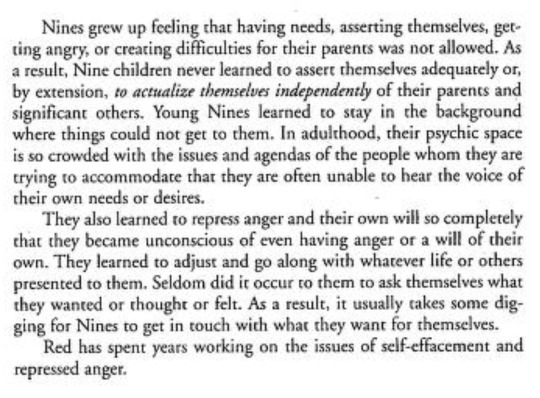
That’s it, ty for reading. Even if it’s a bit of a mess, hopefully you’ll have gained a thing or two from it. Falin is a character hard to pin down, but it is very gratifying when you find the way that the puzzle pieces fit together right for your own understanding of the story. Fantranslation of the shuro proposal comic by @/thatsmimi here.
Here’s my spotify playlist for her if you’d like
Sometimes love is about letting go, a lesson a lot of the cast needed to learn. Self-love’s important too, and just like with diets we need a healthy balance.
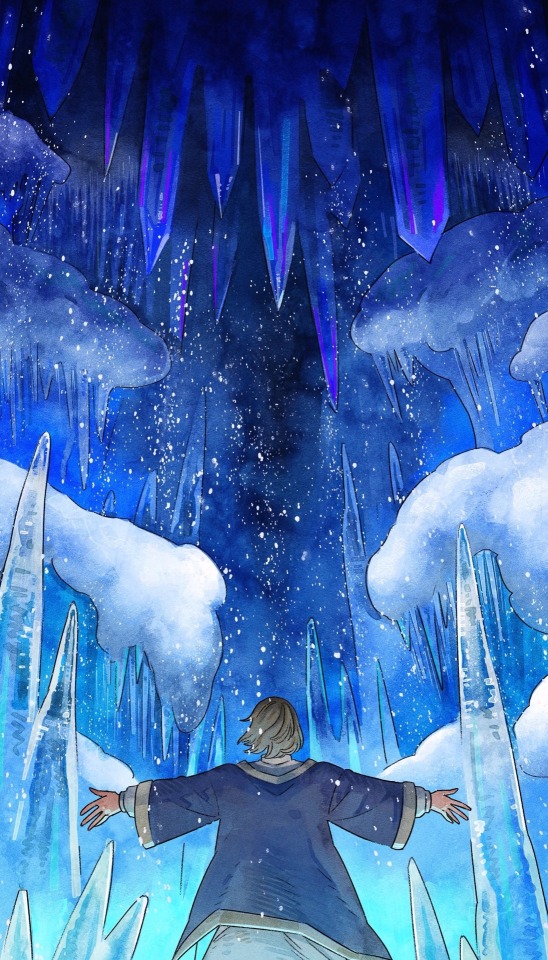
#I find it hard to express myself right on the topic of Falin. Both because the issue is pretty vibe based and because we don’t#get that many moments with her. So there’s ambiguous scenes up to interpretation addressing a layered topic and like. Save me. Save me#As always falling down the rabbithole of starting an analysis about a specific facet and then needing to explain everything else around it#I’m doomed. I’m getting lost in the sauce.#dungeon meshi#delicious in dungeon#falin touden#analysis#character analysis#meta#autistic reading#aroace reading as well. Sort of. It’s mentioned#The aroace autistic guilt of not caring back in the way/with the intensity you’re expected to#As always this is just my interpretation blablabla#Spoilers#dungeon meshi manga spoilers#She loves like a dog aka unconditionally and happy with eating scraps of affection and attention off the floor#Laios touden#he’s here too bc they are an unit#If you’re not capitalizing on the uncanny vibe autistic effect for Falin’s character u are missing an opportunity imo#Fairy’s child is written all over her. Her cryptic-ness is the point so why am I surprised she’s hard to fully pin down#Even with the graveyard scene it was Falin following Laios… Sob. Laios could feel responsible her powers were found out#I’d like to rework this at some point if i get better at structuring. I’m not satisfied by the level of clarity#Will 90% for sure edit stuff in if i find more to say.#Fumi rambles#Crazy style#I give a TLDR at the end if you’d prefer. It doesn’t have the like evidence/explanations alongside but it makes the main points i think
1K notes
·
View notes
Text
The Daycare Attendant and Their Dialogue
A little ramble on some of the things I've noticed about their ways of speaking. This post ended up being predominantly about how they refer to one another. Most of this is speculation mixed in with my own views on them and their relationship, without discarding some other possible alternatives (for instance, although I do view them as two AIs that heavily rely on each other to function properly, I do not cast aside the interpretation that they are the same person).
(note: although I have played SB and Ruin, I did not play HW2 myself. All I know about that game has been through let's plays).
Sun is, obviously, the chattier of the two. Not only are his sentences longer, he speaks more of them in a row than Moon does - in fact, we only see Moon going on and on in Ruin (which we will discuss later).
Both of them use a lot of repetitions when speaking. From their infamous "clean up, clean up" line, to Sun's panicked "you like glitter glue? I have glitter glue!" and "light's on! Light's on! Keep the generators on!", to Moon's "hidey hide, hide away" and "bad children must be punished. Bad children must be found", "knock knock", etc. One of the first things Eclipse says is also a repetition ("warning, warning"). They appear to occasionally rhyme their words too, or at the very least use similar sounds in their sentences. This is a robot that works with young children, so it's not surprising.
On that same vein, their main insult to misbehaving children (and employees... or at least Cassie's dad) is also a repetition: "naughty, naughty" (which turns into "naughty boy" for Gregory), "rulebreaker, rulebreaker", and "bad kid, bad kid". In fact, it appears they repeat words more often when they're mad/stressed (Sun's no no nos, Moon freaking out in Ruin). Taking into account they get mad pretty easily when things don't go their way, it's not surprising we hear it so often, but it's neat.
Although both of them speak in an almost song like manner, with Sun's run on sentences flowing well between one another, Moon is the one where this is more evident due to how much shorter his lines are.
Moon is also the one who speaks in a more childish manner. Not only are his phrases shorter, he doesn't articulate them as much as Sun does, and seems to prefer shorter words and sounds, especially giggles. This makes Sun appear more developed. Key word being appear.
Sun tends to speak as if he's entertaining a crowd, doing his best to keep the attention on himself while trying to keep it fun. This is most evident in his level explanation parts in HW2, but it's also clear in SB. In Ruin, this is absent for... obvious reasons.
Both of them are somehow direct in their way of giving orders/saying what they want to do. When they can't be direct, they find workaround truths in order to conceal what they truly want to say, while keeping the main order clear (such as Sun saying the player will hurt their eyes if they work in the dark and ordering them to keep the lights on, rather than saying Moon will kill them so keep that room bright. Direct, but nicer).
Not at all important to FNAF speech lore but I think it's funny: Sun says the infamous Vanny line during the daycare intro section. "Are you having fun yet? (Are ya, are ya?)". 0.5 seconds after Gregory just stands there, which coincidentally is what Vanny does 0.5 seconds after Gregory gets into a vent (numbers exaggerated). I don't know. I just think it's funny. Replaying the daycare section after hearing Vanny yapping that line non stop gave me flashbacks.
The way they refer to each other and the pronouns they use are an entire thing, so let me separate it in two parts.
So that this post doesn't become scrolling hell on the tags, I'll keep it below the read more line:
Sun
Sun is the one who refers to himself the most. He frequently uses "I" or "me" when talking about himself, and does it way more often than Moon. Examples of this are "I have glitter glue!", "I'm stuck in a nap", "it really speaks to me", "I feel dumber just looking at it" - you get the point by now. The reason I'm going hard on this point is to contrast his way of speaking to Moon's.
When it comes to him referring to Moon, we only ever hear it twice. In HW2 he says "He'll wake up if the lights go out!". In Ruin, he says "Not me, the other me!". Besides those two voice lines, he merely alludes to Moon without ever mentioning him by name or by pronouns (such as when he says he'll turn the lights off himself, implying he'll let Moon deal with you, or when he says you can't work in the dark and instead of saying the real reason as to why, he cuts himself and goes "You'll- hurt your eyes if you work in the dark").
This is interesting for two reasons: one, we only see him directly mention his counterpart when he's in a ruined state (the HW2 voice line comes from the mask off section, when they're broken down. At least I think so); two, he simultaneously views Moon as separate from himself ("he'll wake up") and as a part of himself/another side of himself ("the other me"). You can take that as them really being the same "person", or as a reflection of their complicated body sharing situation. Take it as you will.
As far as referring to himself and Moon at the same time, he only does it in Ruin when he states "We need to be whole".
Moon
The way Moon structures his sentences means that he seldomly actually refers to himself directly. For instance, he doesn't say "I will find you" or "I will punish you", putting himself as the subject of the sentence. Instead, he puts others as the subject, wording it as "Bad children must be found" and "Bad children must be punished". This is consistent across all of his voice lines except one... Well, technically two.
To get it out of the way: there's a deleted voice line where he says "I'm putting you in time out", a line he and Sun share and which worked the same way the clean up one does - them saying the same thing, a push towards them being the same person ordeal.
The only in-game time he refers to himself directly is in Ruin. This line is also the only time he refers to both himself and Sun as a duo. This line is also the longest line of dialogue Moon has.
"(groaning noises) Naughty! Naughty! Make it stop! The light makes us hurt! Grind Grind! Grinding gears inside my head! We can't move. Error! Error!"
This line, much like Sun's, is interesting for various reasons. Even though Sun is no longer with him (being stuck in the VR world and separate from Moon, shown by how Moon can't move because the lights are on but his body can't shift into Sun, so he's completely stuck), he first refers to himself as a "us" - adding Sun into the mix. Then he refers to himself alone, "my head" instead of "ours", before going right back to a plural.
We can assume one of three things here: one, Moon refers to himself as a we more often, adding Sun into the mix, a complete opposite of his counterpart who typically speaks in singulars; or two, Sun is not as absent as he appears and in that moment he is in fact with Moon, just stuck on the passenger sit, hurting alongside him; or three, this is merely an effect of this being in the Ruin DLC where the whole point of the daycare section is to fuse Sun and Moon into the Eclipse, so the writers decided to bring the point home further. If you have more options, feel free to add them.
Side note: This voiceline also shows Moon's speaking patterns pretty well. Putting "the light" as the subject instead of "we/I", the rhyming, the repetition, the clipped sentences compared to Sun's endless ones, the noises, the scratchiness, the vague childlike mannerism... All ending with "we can't move", way more straight to the point, said right before he freezes up, which deviates from the "other subject first then me" rule due to the pain tearing through him at the moment.
Moon does not call Sun "the other me" or anything similar in any of the games. He never refers to Sun as if he too was Sun. However, we can assume his view on their situation probably mirrors Sun's - being in the same body and all -, so take it as you will.
And as for Moon referring to Sun as a separate individual... He does not refer to him as a "he". Instead, he actually mentions his counterpart by name, saying "No more Sun". Meaning he's the only one of the the two that has canonically used his other side's name. I think it's interesting how the least chatty one is the one actually calling the other by name and not the other way around. And yes, you can say it's a way of speaking and he's referring to the concept of the sun rather than saying his name, but taking into consideration Sun never utters the word moon, I'd say it's still quite a big thing.
In my headcanon land, due to the happenings at the Pizzaplex, Sun is probably too embarrassed and mortified to even mention Moon. Moon, on the other hand, has no reason to have such troubles besides hating Sun for (in his perspective) keeping him locked in a prison of light. So for me, it makes sense we never see Sun saying Moon's name, and it makes it more impactful when he actually acknowledges Moon as the other me rather than a he.
Eclipse
I lied there's three parts.
Eclipse has very few voice lines. The only one that matters here is "We need to clean this place up before we can open in the morning." This is pretty straight to the point: Eclipse, unlike Sun and Moon, doesn't use an "I". They immediately speak in the plural. They do not view themselves as just Eclipse, but rather as both Sun and Moon combined, at the same time.
As for the DCA being two AIs or one... in Ruin, Sun thanks Cassie after Eclipse is activated. It's left ambiguous. You can say Sun speaking afterwards proves they're not one and the same, "with the Sun and Moon AIs still running separately somehow", or you can assume Eclipse existing doesn't mean Sun and Moon can't keep doing their thing under safe mode, albeit in a less chaotic manner, allowing Sun's voice to come through but not making him any less Moon - he is Moon, he is Sun, and they are complicated yet very simple.
I believe in whichever version is more convenient at any given time, with a preference for "two codependent AIs" given what the games show us. Although, going by everything I collected here, the only theory I believe to just not be supported by canon at all is the one with Eclipse as a separate thing all together. Eclipse refers to themselves as a "we', not an "I". Eclipse activates when you make Sun and Moon "whole". It canonically makes no sense for Eclipse to be a third thing. (Please remember this is a post about what's in the games, the canon of FNAF. AUs and fandom or whatever, you do you).
That's it. Hope you enjoyed my rambling. Uh artblog unpaid promotion @tagidearte thank you for making it this far.
#dca#fnaf#daycare attendant#fnaf moon#fnaf sun#sundrop#moondrop#fnaf eclipse#fnaf security breach#fnaf ruin#help wanted 2#hw2#if you wanna know#I spent time on this because...#I am writing two fics for them (just them and other canon characters)#and although Sun's dialogue comes easy to me#I did all this analysis just to be able to write moon's#never say fanfic doesn't make you look at stuff in ways you'd never really do otherwise
579 notes
·
View notes
Text
honestly just in general it's very exhausting to try to analyze media that is literally meant to be analyzed, only for the replies to be filled with people arguing not against your analysis, but against the premise that the media can be analyzed at all.
i don't even know what to say about it without starting to really betray my frustration, so i'll just settle with— just don't engage with analysis posts? I'm serious. if you're typing a response to a media analysis post, reread what you've written and ask yourself "is this comment/response against the very concept of analyzing the media at all?" and if the answer is yes then delete it all and go sit in the shame corner. throw your curtains away if you want to so bad and stop telling me that I'm not allowed to hum and haw at the fact mine are blue
#ml fandom salt#I suppose#and no amount of adding ''stop telling me to not analyze the media'' on my analysis posts stops people from saying it anyway#and yes. the leaks count. stop telling me that the existence of outdated leaks invalidates all analyses of the completed material#and no. just like every other time i've said this. me saying that i don't care about the leaks is not an invitation for you to try to#convince me to care about the leaks#do i tag this spoilers? it feels weird to. i mean this to be a vague overarching thing about media in general#also of course any ''or maybe the writers are just bad'' arguments ALSO are included in this. YOU guys have been my bane since FOREVER#would you guys consider commenting on fanart with ''umm.... drawing seems pretty pointless lmao'' rude?#i know this is not the first time i've made a post like this and i'm sure it won't be the last
5K notes
·
View notes
Text
Ideology of Exceptionalism and Gravity Falls; meta and character analysis

I had a whole ago read a post by @icanlife that had a quote by Alex Hirsch on Ford's greatest flaw, and wanted to explore what the flaw is, which is the ideology of exceptionalism; in the exploration, I’ll touch on what it is and how it is used in abusive relationships and cults, as well as how it drives multiple Gravity Falls characters and consequently how it impacts relationships between these characters, and how the show ultimately refutes exceptionalism.
Quick note here; I am not in any way, shape or form a psychologist nor have any formal training in psychology; this is written from my own experiences with this ideology and my own forays into psychology and trauma-informed learning. It is also written with a loose understanding that is likely not broad enough to cover all references to cults, extremist groups and abusive relationships.
The Ideology of Exceptionalism
First of all, we have to get through a drier bit, which is… what is the ideology of exceptionalism and how does it arise? Might be fairly obvious, but it is the belief that you are, or belong to, a group of exceptional people, thus more important and worth more than anyone else; ie, those who don't qualify as 'exceptional'. It is often a subconsciously learned ideology. Now, what qualifies one as exceptional can be extremely varied; generally it revolves around something that provides some form of privilege. Thus, it might be, as the main exceptionalist idea in Gravity Falls, 'intelligence', or power, or it can be such things as attractiveness, quantity of money one has, species, nationality, or skin colour and ancestral heritage. The ideology of exceptionalism, being by nature hierarchical, devalues, and at its worst, openly and violently dehumanizes those who do not qualify as exceptional.
For why exceptionalism occurs is an extremely broad topic, but I've personally found that, for exceptionalism revolving around intelligence, it's a result of a poor sense of self-worth, and having one's self-worth tied to what makes one exceptional. Poor self-worth itself (again, broadly) is a result of childhood trauma from a lack of positive affirmation and unfulfillment of the emotional needs of the child. Meanwhile, self-worth becoming tied to the quality of exceptionalism generally is a result of when positive affirmation was pretty much solely provided around their 'exceptionalism', especially when provided derogatory commentary, or a blatant example of how they would be treated if they aren't 'exceptional'. As a result of the general lack of affirmation, self-worth then becomes often solely reliant on the qualities of exceptionalism, as that is the only way for the child (and later, adult) to get affirmation of their worth, as well as out of fear of being ‘not worth anything’ like the examples of ‘non-exceptional’ people they have been given.
This is especially likely to occur when the child is a social outcast; the adoption of the hierarchical ideology of exceptionalism, and the devaluation/dehumanization of others often occurs subconsciously as an avoidance/minimization tactic from pain. This is to say, the child, and later the adult (if healthy self-worth is not established) goes 'it doesn't matter what the non-exceptional people say or if they accept me since I matter more than them because of my exceptionality'. It can even be taken further, that being shunned is part of one's exceptionalism, and becomes part of the qualifier of being exceptional. For instance, 'they just can't understand because they aren't exceptional and that's just a part of being exceptional'. This idea also neatly tailors into the part of the concept of being better then others means you are separate from others; this can be taken that someone who is special, needs to be alone to be truly special.
Obviously, exceptionalism is not a healthy coping mechanism for poor self-worth, as often such people constantly feel the need to prove and show off their exceptionalism to gain that affirmation and avoid rejection, which is stressful. As well, it often negatively impacts their relationships with other people as a result of the arrogance of believing that they are better than most others, or even deliberate sabotage due to their arrogance. This occurs as they flatten the complexity of human experience to black-and-white hierarchical categories of exceptional/not-exceptional through constant judgement of those they meet, and often refuse to engage with people who don't belong to their 'exceptionality', or even people they simply don't like, even if they technically qualify. Generally, those that they do like or have close relationships with, often due to being similar, are automatically labelled as 'exceptional'. Those judged as ‘exceptional’ also become privy to the open judgements of ‘non-exceptional’ others, out of a subconscious belief by the exceptionalist that the other believes similarly; something that may strain their relationship if the other doesn’t ascribe to exceptionalism. This all culminates in the exceptionalist being blind or even adverse to the diversity of experiences, which makes it difficult to create relationships and community outside of echo chambers of their own beliefs (if they can even find this), and subsequently, these people are often isolated and have very few to no close relationships with people.
However, all humans require connections with other people, relationships where one can rely on others emotionally and physically if needed and feel accepted; they also require to feel like they are worth something, that their life has meaning. Lacking meaningful connections and having a crippled sense of self-worth, a deep yearning hole is left in these people. Exceptionalism, especially as it is a narrative constantly pushed by Western society as it validates hierarchies, is then employed as a (often subconscious) trauma response to assuage this yearning hole, with arrogance and denial. And depending on the circumstances, it can be a very strong and definitive trauma response for people.
This isolation and lack of self-worth is catnip to abusive relationships, including cults and extremist groups. These types of relationships often heavily rely on isolating their victims or pulling them into echo chambers of solely the abuser’s rhetoric, to redefine what is healthy through gaslighting; as the exceptionalists are already isolated, this makes them extremely susceptible. They also often provide these people affirmation, and in these cases especially about their exceptionalism, thus confirming their self-worth, their 'specialness', while also providing them the connection they have been lacking, either through the cult community or through the abuser’s own presence. These emotional needs, which haven’t been met in a long time, if ever, begin to be fulfilled; something that abusive relationships and cults hinge on, rather than any form of logic.
Ideology of Exceptionalism and Gravity Falls
The main characters within Gravity Falls which are heavily ascribed to exceptionalism would be both Ford and Bill; this characterization deeply impacts the story and their relationships with others (technically the Northwest are another case regarding wealth, but less directly impact the storyline and thus tangential; Gideon also is an example, but as a mirror of Bill). With each of these characters I’ll go into detail within their sections on the way they began to ascribe to exceptionalism, and how it plays out later in their relationships; I will first begin with Ford, then move to Bill. Then, to cap it off, I’ll go into the characterization of Stan and the way Gravity Falls refutes exceptionalism.
Ford and Exceptionalism
Firstly, the quote from Alex Hirsch that kicked this whole baby off, as mentioned previously;
“Ford sees Dipper as someone who’s special like himself. That’s Ford’s great flaw, his arrogance is he believes that there’s special people, and everyone else. That human attachments are actually weaknesses. And the song and dance that he’s giving Dipper right now, is the song and dance that he gave McGucket, back when they were younger… ‘You and me are different, we’re better than everyone else. We have a path that no one else can understand, and only us can do this.’ It’s a very seductive idea for Dipper… Dipper is a smart kid, but Ford’s projecting. Ford loves Dipper because he sees someone who’ll tell him ‘yes’ to everything. Who’ll never challenge him, who’ll do a really insane dangerous mission.”
Very blatantly Alex Hirsch calls Ford out on his arrogance in the belief that he is special, in his belief in the 'lone hero' complex, in his belief in exceptionalism. And really, it should be no surprise that Ford does so, considering the way he's depicted as a social outcast as a child (other than Stan), and the way his parents have been clearly shown to be not particularly emotionally supportive (“I’m not impressed”); they don't provide positive affirmation except for his intelligence (mostly due to the possibility of money making through it…), while also actively comparing him to Stan who is derogatorily ‘not-exceptional’, and ‘worth less’. This all sets Ford’s self-worth up to be fragile, and other than Stan who wholeheartedly accepts him, he is isolated and invalidated; plus, the only other validation he receives is around his intelligence. All very classically fitting the profile for exceptionalism.

Image id: Stand and Ford when they were children, both clearly enjoying each other's company.
Ford’s belief in his exceptionalism catalyzes after the shattering of his and Stan’s relationship. Previously the twins are shown to do everything together, having a very close caring relationship; something unlikely if Ford thought he was better than Stan. Also, when Ford is talked to about his opportunities, Ford looks uncomfortable at the way they talk about Stan as inferior, compared to how he himself is being praised; but in the offer he’s simultaneously finally being validated, he’s being told he’s someone worth something, and he’s going to be someone worth something after this. And then the science fair incident occurs, and Ford loses that validation from his parents, from the judges and a future of more validation; after being promised validation and acceptance, it slips through his fingers. And in his anger of being denied that, it becomes easy to begin to slip subconsciously into the rhetoric the others have been feeding him; that he’s exceptional, that Stan isn’t, and he deserved to be recognized for his worth. So he breaks the relationship with the only person who accepted and validated him for who he is. With that loss of previous support, Ford becomes then deeply obsessed with proving his exceptionalism to the world to assuage that fragile self-worth, to become accepted, or even better, revered, confirming that he is someone of worth, someone special, like he was promised.
Ford’s obsession also doubly functions as a way to alleviate his guilt over shattering their relationship; if he’s exceptional as he believes, then he’s within the right to respond the way he did, as he’s worth more than Stan, he's better off alone, and he has a right to be angry over being denied that validation. As well, in much the same way as it is used as a way to alleviate his guilt over the end of their relationship, it is also likely used in a way to minimize the pain of being ostracized (although not directly depicted); afterall, Ford’s keenly aware and insecure about his social ineptitude and his six fingers as things that make him different from other people, case in point with his experience visiting Lazy Susans Diner. Thus it wouldn’t be unsurprising if he uses the idea of being worth more than those who ostracize him to imply it ‘doesn’t matter’ what they think. His ostracization by nature keeps him from generally forming close relationships, with the exception of Fiddleford (who much like him, is socially outcast, and intelligent) during his university days. As a result, he's isolated and acutely lonely, having lost Stan.

Image id: One of the missing Journal 3 pages in TBOB, detailing Ford's botched social interaction in Lazy Susans Diner. In the background is the print of his six-fingered hand.
In his obsession over being acknowledged, Ford, like many others who believe in exceptionalism, identifies strongly with the causes of his ostracization (his intelligence, his six-fingeredness) as part of, or wholly, makes him exceptional. It is obvious through his choice of study; with the grant he has been gifted, he chooses to revolve his work around the weird, the outcast, something that you see Ford gravitate towards being an outcast and deemed 'weird' himself (which in Journal 3 he openly talks about). Something that can be, much like him, framed as 'exceptional'. His work is even recorded in a journal that Ford deliberately chooses to put his six-fingered hand on the cover of. Intertwined with the way it becomes adopted into the idea of exceptionalism, is the keen loneliness from his ostracization and a deep desire to be accepted and a wish to find a community of other weird people.

Image id: Two pages from journal 3, labelled 'Myself', in which Ford is open about being weird, and a social outcast, while also noting his ambitions and that 'Gravity Falls, [is] the place that I fit in.'
Ford and Bill
All of this culminates in Ford becoming an incredibly easy target to manipulate by Bill. He’s desperate to be acknowledged (and thus accepted) by an authority figure so that his belief in exceptionalism is justified and his self-worth confirmed. And he knows he’s intelligent, that he's exceptional because people have told him so, but he just needs to prove it with something that shakes the world. And the grant is finally his second chance after the fair, but he's stuck, and the research is going nowhere, and he's in a town where he doesn't really know anyone and he’s so terribly lonely. And sure, he clings to his exceptionalism but if he can't even prove it then is he really exceptional? Is he even worth anything like he thought he was? And what about what he's left behind, rejected, because of his exceptionalism?
And THEN he finds an incantation and he ignores the warnings because maybe, just maybe, this will be his break to get that acceptance/validation he has been chasing his whole life?
And then it's better than that.
A god, essentially, shows himself to him, an ultimate figure of authority. And he tells him that yes, he is special, he’s worth more than other people, and Bill’s only showing himself to Ford because he is so much more intelligent than anyone else. Ford is suddenly getting his exceptionalism confirmed by a god of ancient knowledge, an immensely intelligent interdimensional being, and he’s also showering him with affirmations, specifically affirmations around what Ford's fragile self-worth is based on. And even better, he's delighted by Ford's six-fingeredness; he's not put off at all, it even becomes his main nickname for Ford, just like it used to be for Stan all those years ago. On top of it all, Ford's own social ineptitude doesn't phase Bill, another thing Ford is self-conscious about; Bill's own social ineptitude as he's not human probably makes Ford feel comfortable, knowing that's not expected from him.
Through Bill, not only does Ford find someone who validates his self-worth through intelligence and even confirms to him that his weirdness is part and parcel of making him special, he also finds someone who he regularly (generally) is in contact with, who enjoys talking to him and even banters with him familiarly. Hell, Bill even deliberately goes out of his way (literally possessing a whole wack ton of rats, then dream karaoke) to celebrate his birthday with him; how long do you think Ford has simply skipped his birthday since he had no one to really celebrate it with? The loneliness, beneath his arrogance and belief in exceptionalism, is being fulfilled; for the first time since Ford was a teenager, he's fully accepted by someone, social awkwardness, six fingers, exceptionalism and all.

Image id: One of the lost pages from Journal 3 in TBOB, the 'one thing led to another' page, with Bill and Ford singing karaoke and drinking together, both clearly enjoying themselves; Bill has an arm slung around Ford's shoulders.
So it's really no surprise at all that Ford fell for this, hook line and sinker. Hell, if I was in Ford's shoes I would fall for it just as hard. And I've seen a few posts floating around talking about how Bill is bad at manipulating, and no, he's not. He was able to pinpoint exactly what Ford wanted and needed, and provided that, was charismatic enough to provide that. Again, manipulation isn't about logic. It really isn't; it's about the emotional core in people, what people lack and what you can give them to slowly reel them in to sing your dance and song. And people will ignore vast swaths of red flags when you're finally being accepted, when you're finally getting your emotional needs met at least in some way or form. It's better than not having them met at all, such as previously. So Ford worshipping Bill is really not a surprise, especially as Bill deliberately stoked it.
All of this is part of why you see Alex Hirsch call Ford's belief in his exceptionalism his greatest flaw; because it allowed him to be very easily manipulated by Bill, and by its nature kept Ford isolated from others, evident by his arrogance in assuming he knows best and refusing to see other people who aren't as 'intelligent/weird' as him as worth getting to know, listen too and even reach out to ask help from, it's him believing he has to be the lone hero as someone whose 'special'. It's something that blinds him to the danger of his work around the weirdness of gravity falls because he’s desperate to seek a place where he and his weirdness belong, and it's something that plays out in each and every relationship he has because it's something he clings to so deeply. It's what cost him his relationship with Stan, who previously accepted him completely, and, as he's disinclined to form new relationships and as Bill actively strokes his paranoia (Trust No One…), ultimately further increases the hold Bill has over him. It's only Fiddleford’s presence as he works with Ford that allows him some form of outside reference and reprieve from solely Bill’s influence, something that Bill resents deeply and is clearly jealous and angry about, even if Fiddleford is helping create the portal. And it's ultimately Fiddleford, once he was aware enough of what was happening, calls Ford out on it, seriously jeopardizing Bill's influence over Ford; but Ford is too invested in the portal, in chasing his own ambition and caught up in Bill’s manipulation to take him seriously, until the incident with the trial, and Ford beginning to hear other voices then Bill.
Ford’s Exceptionalism and Wider Relationships
Now back to how it plays out in all Ford's relationships; we've already gone over it with Bill's influence, because it made him extremely easy to manipulate, and with his disregard of Stan in favor of validation of his exceptionalism. But Ford, as pointed out by Alex Hirsch, also exerts the ideology's seductive rhetoric to both Fiddleford and Dipper (who look up to Ford) in a similar way that Bill does with him (although there is a difference of it being used intentionally and maliciously, compared to subconsciously and earnestly, even if it is problematic). Ford, with his black-and-white view of exceptionalism, sees both Fiddleford and Dipper as people who are like him; 'exceptional', and so he treats them as such, and uses this rhetoric to coerce them into helping him.
For Fiddleford, the lure is how he can change the world, how he can be finally acknowledged if he helps Ford with the portal. And it works well; he willingly chooses to leave his own work and his wife and young son, to work with Ford. Much like Ford, Fiddleford himself is also a social outcast and regularly presumed less smart than he is, and he’s got a chip on his shoulder to prove himself, to gain acknowledgement and recognition from the world at large. Although Fiddleford has a family which presumes he’s not entirely lonely like Ford is, he also clearly has deep feelings for Ford, some which are hinted to be more than just ‘friendly’ feelings; it is likely the combination of the lure of validation and spending time with Ford, a kindred spirit that accepts him and an old friend/crush, that causes him to agree (afterall, it was Ford who made Fiddleford feel accepted and choose to stay at Backupsmore). And Fiddleford’s not even considered a partner, but rather an assistant to Ford due to Ford's arrogance, and he still drops everything to go! It’s more about their relationship and connection rather than validation, but that doesn’t stop Ford from espousing exceptionalism. And this is a distinguishing difference, because although Fiddleford would like recognition, he’s not there solely because of it; he’s not a believer in exceptionalism nor arrogant about his skills, and so, unlike Ford who is blinded by his obsession, he’s much more aware of the dangers of the weirdness of Gravity Falls. Thus, he's actively calculating the risks involved, and when he realizes there could be potentially devastating consequences of the portal, he attempts to talk Ford out of it; this fails due to Ford’s own denial and obsession over the portal. In the end, it all goes terribly sideways, and Fiddleford ends up losing everything he had; his wife, his son, his friend, his memories and himself to the trauma he had experienced at the invitation of his friend with the lure of validation and company, due to the memory gun he had created himself.
As for Dipper, much like Ford, he also has issues with self-worth (many of the episodes deal with Dipper finding self-worth; ie, the manotaur episode), has a physical oddity (his birthmark) and by far the trait he relies on most for worth is his intelligence (for example, in one episode he rubs it into Mabel's face over and over again in beating her in games). He's also extremely desperate to be recognized by authority figures as someone intelligent, case in point when he summons the dead after being made fun of by the government agents to try and show them that the information he's gathered is important after Stan dismisses his knowledge. This desperation to be seen as someone of worth from Dipper, much like Ford, extends to the need to be a hero, something he even says at the end of the zombie episode; yet, due to Mabel, unlike Ford he's not a lone hero, and Mabel also half the time acts as the hero.

Image id: Zombies crawling out of a crack after Dipper summons them; Dipper and the two agents look on in horror.
It all culminates in Dipper hero-worshipping Ford when he returns; really, no different than Ford worshipping Bill. And Ford clearly finds it extremely flattering; Dipper's attention and amazement of him feeds his exceptionalism. Exactly how Ford responded to Bill, Dipper is willing to do anything for Ford, excited too, in an attempt to impress Ford and be validated and accepted. And for Ford, that's an extremely heady feeling, especially as someone who has been constantly alone the last 30 years, especially when he had one previously confirm his exceptionalism all those years ago and stopped, and now someone is once again affirming that idea. And Ford doesn't have to be alone again, because he's found a kindred spirit in Dipper as his assistant, someone ‘just’ like him, someone who is exceptional. Because he sees himself in Dipper, he begins to espouse exceptionalism unconsciously, by praising Dipper's own intellect and adventurous spirit, assuaging his feeling of self-worth, while also telling him he's more important or better than others because of it.
And it's seductive to Dipper, because he wants to hear those affirmations of his self-worth, especially as he hero-worships him, but Dipper isn't sold on it, because it means leaving Mabel behind, it means believing that he's worth more than Mabel (and also, Stan, and all his friends he’s made in Gravity Falls). It's ultimately because of his relationship with Mabel that he rejects the ideology; he's not isolated the way Ford was with Bill, and he's not willing to break that relationship for that acknowledgement, because his relationships matter more to him.
Bill and Exceptionalism
Now of course, that's only on the Pines; what about Bill?
While it's obvious that Bill uses exceptionalism as a main manipulative tactic, it's not just an ideology he sprouts emptily; it's also an ideology he believes in, just like Ford, although it's less based on intellectual exceptionalism, and more on power and 'weirdness'.
This most distinctly can be seen in Bill's denial about what happened to his home dimension; Bill's belief in his exceptionalism occurs as a pain avoidance tactic from killing his whole dimension. Bill was clearly a social outcast within his dimension due to being able to see 3d; he's not accepted, and not trusted, to the point that there is medical intervention to make him blind. That's a deeply traumatic experience that completely erases one sense of self-worth, where one’s sanity is called into question by your parents on something that is not harmful, that's beautiful and you just want to share with them. It's a deep and clear rejection of who Bill is, and his ability. As a result, out of a desperate bid to be understood and accepted, he ends up trying to show them the stars. And it ends up killing everyone.

Image id: Page of TBOB, on 'The Early Years' which notes that Bill was an oddity for seeing 3d, something that was illegal to speak about. Bill frames it as something that made him 'special' and better than all the others.
Traumatized, and originally rejected by the dimension, he instead weaves an excuse of exceptionalism; that it doesn't matter what he did to them because he's exceptional and he's worth more than all of them because he can see 3d, because he's powerful, so he shouldn't/'doesn't' feel any remorse about it. With such a traumatic result of trying to be accepted by people, he rejects the idea of trying to be accepted for who he really is; instead adopting a facade of a monster that he believes he is (and eventually, becomes).
Even if he clings to the delusion of exceptionalism, and shuns attempts to find true acceptance, he still wants it; and that's where his henchmaniacs fit in, as they're all, as Bill's noted when trying desperately to get Ford to join him, weird; each has something 'wrong' with them, which is why Bill accepted them as his lackeys (although it's not like we know the context around these). It's a surface-level acceptance however, one more predicated on fear than emotional acceptance. He's taken his 'weirdness', much like many do who believe in exceptionalism,as ‘part of what makes him exceptional'.
In the same way that Ford wants to show the world that he's smart and intelligent by building the portal, Bill does so by wreaking havoc and taking over existences as a way to show the world that he's powerful, that he's someone to be reckoned with, that he's not someone to be ignored because he's someone who's worth more than others. If you can't be loved and accepted, then being hated and feared is better than being ignored; acknowledgement at least approaches acceptance, it's validation of some sort of worth. It also functions as deliberate self-sabotage of his morals, by proving that he is the monster that killed his entire dimension; if that's what he is, then that's who he's going to be, because if he wasn’t, then he has to come face to face with his remorse over what he did to his dimension and his whole house of cards around his exceptionalism and not caring collapses. So instead he keeps feeding the delusions the denial, and lies and lies and lies and keeps lying to ignore all of it, to wrap himself in this shroud of exceptionalism and brutality as a way to function. And it somewhat works, because he's mostly deluded himself about it all, even if subconsciously he knows.
And of course, this display of Bill's exceptionalism is what brings Bill to earth, to Gravity Falls, and to manipulating humans. In meddling with earth and humanity, beyond Bill's goal of taking over earth and fleeing his own unravelling dimension, he also enjoys reaping the benefits of being worshiped by humans, who find him awe-inspiring. Their amazement of who he is, and Bill's own posturing and manipulation of people leads to Bill literally forming cults (ie ciphertology) or having apprentices that worship/find him (to varying degree) inspiring; all reinforcing his feelings of exceptionalism.
Of course, Ford numbers among these people; he praises Bill and worships him, as he's played like a fiddle by Bill, because his self-worth and belief in exceptionalism is fucked up in a way that perfectly resonates with Bill’s. Because it's the exact same types of issues around self-worth, around being an outcast, being weird and wrong physically, and yet at the same time gifted. And Ford clearly is incredibly lonely and yearning for acceptance, but so is Bill; since the beginning he's been trying to find someone who would accept him, even if he's given up on it. And for his song and dance to entice Ford in, he pretends he's not crushed dimensions for fun, that he's not a 'monster'; a version of him he buried after he had tried to show his parents the stars, one that he occasionally resurrects and puppets around for manipulation (all lies are better when they have a grain of truth). And this version of him is worshipped, but above all is accepted, is loved by Ford. The softer parts of Bill, even if they are still weird as fuck, the parts that were never far beneath the surface for all his deluding, become loved by Ford. Much as Ford becomes hooked on Bill’s praise, Bill also becomes hooked on Ford's genuine love and care. It becomes personal, unlike any previous ‘inspirations’ and Bill over time gets to the point that he feels accepted, safe enough with Ford to share about his dimension much more close to the truth then he did with any of his henchmaniacs. He becomes vulnerable with Ford, in response to Ford’s own vulnerability with him. He’s finding acceptance for the first time in his life around the softer parts of himself, not just the feared acknowledgement that comes from his dimensions conquering; much like Ford is finally finding companionship and acceptance with Bill, not just only intellectual validation. Bill's also for once, not just self-serving; he cares, and goes out of his way to take time with Ford, even celebrating Ford's birthday (in the unique way he does things), both with the rats and the karaoke.

Image id: One of the lost Journal 3 pages in TBOB. Ford recounts Bill talking about the destruction of his dimension, and calls himself by implication a monster.
They're both fulfilling each other's emotional needs, needs which both of them have struggled with most, if not all of their lives (although their relationship is certainly not healthy, considering it's codependent as fuck, riddled with exceptionalism and oodles of power imbalance issues). And suddenly, against Bill's plans, Ford's no longer just a disposable pawn, but someone Bill wants as part of his team, someone by his side, closer than his henchmaniacs are. He's unwittingly fallen for Ford, and so when everything goes sideways in his plan, and Ford swears it off, suddenly cutting off their relationship and that acceptance Bill had finally felt, he spirals into grief and anger from the rejection. As a result, he becomes extremely abusive to Ford in desperate attempts to continue their relationship, and ultimately he becomes obsessive over Ford joining him again as Ford continues to refuse, as evidenced by both Weirdmageddon and the Book of Bill.
Stanley Pines, and the Refuting of Exceptionalism
Exceptionalism, being a negative driving factor behind many core character dynamics, is ultimately refuted by the show. This occurs multiple times over the show, such as with Mabel in the Pioneer Day episode, especially compared to Pacifica, but mostly through Stan's characterization. Stan is someone who has been since the beginning characterized (if lovingly so) as someone who is a failure by societal standards; he’s an older man running a run-down tacky tourist shop to swindle gullible tourists out of their money, has multiple divorces, has an ongoing feud with a literal 12 year old, clearly has had multiple mishaps with the law (some ongoing), is generally pretty self-serving and is extremely lonely and really had no close relationships until Mabel and Dipper showed up. He's not exceptional; he's not even what we would consider 'decent' enough to have a 'typical, hard working job’. In short, he’s a failure, a stark difference to the idea of 'exceptionalism' that characterizes Ford. If he's gifted in any area, it would be charisma (debatedly), not anything else.
But it's still Stan who rebuilds the portal from literally only one journal (not all three!) and gets it to work. It even seems like he only needs some codes from the other two journals when he does get them, suggesting that he was able to extrapolate from what was left and the first journal’s blueprints to fix it entirely, something that is extremely difficult and technically complicated (Ford, Bill and Fiddleford all worked on it together!). Stan's able to do it, even if it's been shown he's not 'naturally' gifted in that area. And it's something he does as a result of his deep care for Ford; because even after their fights, he cares about Ford and wants to right his wrongs, believes he should, because of his whole life of being defined as a failure and even worse than that, screwing up his ‘exceptional’ brother’s life. And he’ll do it even if that means learning how to build an interdimensional portal, even if it takes up thirty years of his life doing so, and he doesn't waver. Much of this is connected to his own complexes around being deemed a failure compared to Ford, having failed to succeed in his life, and how he feels that he needs to atone for screwing up Ford’s life, now for the second time; but beneath it all, he also cares. Much like Ford, he's extremely lonely, but he's not blinded by Ford's arrogance, and as a result he wants to make sure Ford's safe, because that's what he used to do, they’re twins, they grew up together, they once they had fully accepted and cared for each other, and dammit that still means something, and Stan hasn't found that depth of emotional connection since. So if possible, he wants to rekindle that closeness they had, but first, he needs to bring Ford back.
And in the end, it's not Ford's own special gun he built using his intelligence that 'kills' Bill. It's Stan, someone who Ford had long ago broke it off with in search of validation of his exceptionalism, someone who both Ford and Bill labelled as 'not-exceptional', who defeats Bill. It's exceptionalism's devaluation of people who are 'not-exceptional' that causes Bill to underestimate the Pines beyond Ford, and it's only when Ford put aside his exceptionalism and his refusal to accept and trust 'non-exceptional' people, that is, trust Stan once more, that causes Bill to end up defeated by Stan.
In the end, it's not about who's 'smarter'; it's a reminder that everyone has different skills and are better at different things, but that doesn't diminish one's worth or value, and that just because someone isn't naturally 'gifted' in an area doesn't mean they can't learn or use different ways to get around obstacles. Ultimately, it comes down to that no one is worth more or less than other people; exceptionalism is a lie. It’s a lie and an excuse, and it's certainly not a healthy way to assuage one's poor self-worth. What does matter is creating positive healthy connections with other people, and caring about them. This creates a community where you can be yourself and be emotionally fulfilled through these connections; and when opposition does arise, you become able to fight it together, and fight so much stronger than if you are alone.
And by the end of the show, you see that. Ford begins to let go of the ideal of exceptionalism and its black-and-white categorization; finally recognizes his own faults around prioritizing validation of his intelligence and exceptionalism over his relationships, and finally, after all the years, chooses to create and rekindle positive relationships with people, trust people, and make amends. And in the end, he goes sailing with Stan, prioritizing their relationship, finally fulfilling their childhood promise.

Image id: One of the pages written by Ford into TBOB. Ford refutes Bill's idea of happiness, and says he has finally found his own happiness, and it looks like the photo taped in, of Stan, Ford, Dipper, Mabel, Soos and Wendy, all smiling together.
TLDR: Exceptionalism, an ideology of categorizing people into being special and worth more vs plebian and worth less, is a trauma response and subconscious ideology that characterizes Ford and Bill’s lives, deeply impacting all their relationships as it is used to coerce people into doing what they want, makes Ford easily manipulated, and breaks relationships through their arrogance. It is ultimately denounced through the way Dipper chooses to reject Ford’s offer and his rhetoric of being exceptional, and through the way it's not Ford’s intelligence, but rather Stan, who has been labeled as 'not-exceptional' and a failure at life, that defeats Bill through trickery. It's a reminder that everyone has worth, and no one is worth more than other people, even if one may be gifted in certain areas; the ideology of exceptionalism is fragile and a lie. In the end, creating a caring, loving community around oneself is where strength truly lies, as is seen with the deep care and love the characters have for each other, and the repairing of Ford and Stans relationship.
Thanks to the lovely @eshtaresht who deigned to beta read this monster of a post for me
If you enjoyed this meta, (first of all if you read all this you're a champ!) I've also done another gf meta post! (It's shorter I swear)
#gravity falls#ford pines#stanford pines#bill cipher#stanley pines#stan pines#hugin rambles#hugin rambles gf#journal 3#the book of bill#thisisnotawebsitedotcom#billford#fordsquared#gravity falls analysis#gravity falls meta#book of bill#tbob#christ its so long whyyyy#also oh nooo i wanna do another thing but SPECIFICALLY on trust. gravity falls is ultimately about strength in community and hnnnghhhhh#that makes me wanna cry#also i had so many thoughts. also on the denial part of exceptionalism??? oh baby Bill fucking LISTS it in his book#like sir. please#anyways i love media analysis and im totally normal about all these characters#also like Fiddleford is. like. yikes man.#anyways uhm. does dropping a 6k essay post make me sexy? please say yes (i HIGHLY doubt it#sheesh who's got time to read all this... psssspsspspp theres PHOTOS that TOTALLY dont have more reading in rhem nawwww#i totally dont know what ur talking about mhmmm#if youre like is this about gifted kids- yes. yeah. i just didnt name it. its also about wider things but. yeah#also. unofficial title? Gravity Falls and Gifted Kid Issues an analysis#oh boy sure hope my post about gifted kid issues is a hit on the gifted kid issues site
622 notes
·
View notes
Text
ngl, i think the most facinating part of Billford, not as a ship (because there’s a general understanding that it was really toxic and they were terrible for each other) (i get that that part of why it’s so fun to explore for so many- not the point), but just in general, is that Bill was ABSOLUTELY as obsessed with Ford as Ford was with Bill. it’s just… so interesting to recontextualize their dynamic as mutually destructive and obsessive instead of Bill just manipulating Ford. Like, yes there was definitely manipulation, but the dynamic jsut has so many more layers when the obsession is mutual.
They’re both egotistical and believe that they deserve more than what the world gave them, and they are terrible for each other and it’s kinda funny and all sorts of facinating to study
#billford#kinda?#it’s more just talking about the mutual obsession these two had with each other and how they we both terrible for EACH OTHER#you know?#gravity falls#character analysis#stanford pines#they’re horrible and traumatized and bill is worse than Ford obviously#ford doesn’t deserve ALL the slander i’m giving him sorry dude 😭😭
581 notes
·
View notes
Text





Comic I made earlier this month. Based on a convo w/ a friend :]
bonus:

Can you tell,,,shes my favorite,,,,
#I just think V laughing genuinely and honestly is something that would literally send me to a early grave#Like we never hear her laugh. like genuinely#like. All we've ever heard is her scary manic laughter#but what about now. now that the world isn't ending for her everyday???#like pls give me a season 2 after like a year of rest Liam. I need the domestic moments. the softer scenes. im begging#anyway yeah im normal abt V murder drones#*kicks my long ass character analysis under the table*#ok bye thx for reading!!!#murder drones#serial designation n#uzi doorman#serial designation v#envuzi#nuziv#jesus christ what is their shipname??? like its implied but christ what do i tag
443 notes
·
View notes
Text
I think about this sometimes but I personally love that Horikoshi took the Yandere trope, split it in two, and gave one half to Izuku and Himiko.
Like it’s so fascinating how you can just SEE how purposeful Himiko was as a character in hindsight standing next to him.
Himiko is a really interesting subversion of her trope for two reasons:
She hurts people because she loves them, not for isolation or destruction of the competition (gore/blood is love to her, not necessarily a means to love someone)
She’s not possessive. Like at all.
I’ve seen that hc a few times and it always bothers me. Ochako is for sure a possessive character (we saw that with Hatsume around Izuku way back at the sports festival arc), but Himiko? Really?
You mean the girl who had a crush on a boy AND the girl who also had a crush on the same boy? Her?
You mean the girl who doesn’t hurt people who love who she loves, rather actively encouraging it in the first place? That one? Really?
Like it’s such an integral part to her subversion too. It’s what makes her such a weird and fascinating character. Possessiveness is supposed to be whats ugly about love itself, yet her love remains ugly without it. She is ugly because the fundamental ways in which she sees and feels about the world are considered “wrong”, “dangerous”, and “deviant”.
But Izuku… ohhhh Izuku…
He holds this trait like a badge melted to his skin. My man cannot escape these allegations. It’s to the point where it’s honestly a fundamental to his narrative. Izuku does not act nor feel the same without it.
Izuku holds a cutesy nickname that literally every other childhood friend of Katsuki’s has long left behind, saying his real name instead (this is honestly why I’m also uninterested in a scene where Izuku calls him “Katsuki” instead of “Kacchan”, Katsuki doesn’t represent the same things the name Izuku does, imo at least), izuku “give him back to me” midoriya, holds his dead body to his chest on a cover, freaked out on someone either hurting/offending Kacchan.. 3 times(?), keeping big boy ofa secrets…. The list goes on.
So it’s this main reason that I think their characters are just so. Fucking. Intertwined. I’m glad this has become a more common interpretation because there’s just so much that aligns between them.
Both of them call their “special people” with -chan endings, both by their first names, both deemed deviants/irrelevant by society. It’s no wonder Ochako fell in love with Izuku, just like she did toga, they’re fucking freaks. They’re interesting. They’re weird. They’re overly friendly and socially inept and a little beaten down by the world yet have too much passion to stay on the ground. They’re envious of the ones they love (Ochako of her freedom to be a normal girl, Katsuki for his raw power and harnessed skill), and I guess I just wanted to make this post because I adore how it’s all done.
I LOVE how the yandere trope is used as societal commentary here. Not necessarily as a way to make the main love interest jealous and feel she must protect the main character, nor for some kinky reason surrounding her character, but because the trope is built off of real, ugly feelings that can and do happen. That love can and is considered truly beautiful in all its forms, especially those of queer people.
So I especially love it because it isn’t just limited to Himiko, but Izuku as well. He may never hurt the ones he loves, but he would hurt for them.
A perfect narrative foil on queer and deviant forms of love. Big fan Horikoshi.
#they’re such freaks and that’s why I love them so much#and so are ochako and Katsuki in their own special ways#just never in the way people think#ochako is a little freak who may or may not think it’s hot when Izuku is a bit beat up.#Katsuki may also be a freak for being weirdly aggressive and so viscerally himself at all times. not even necessarily bc he wants to be a-#jackass but that it’s just who he is to call people asshole nicknames based on appearance or to scream mid battle#ntm my boy was bullied before he got his quirk so like. yk. makes sense that he’s so quick to think that izuku’s been playing the long game#bkdk#togachako#midoriya izuku#mha deku#bkdk brainrot#bakudeku#bnha deku#bakugou katsuki#mha analysis#deku midoriya#uraraka ochako#himiko toga#ochako x himiko
855 notes
·
View notes